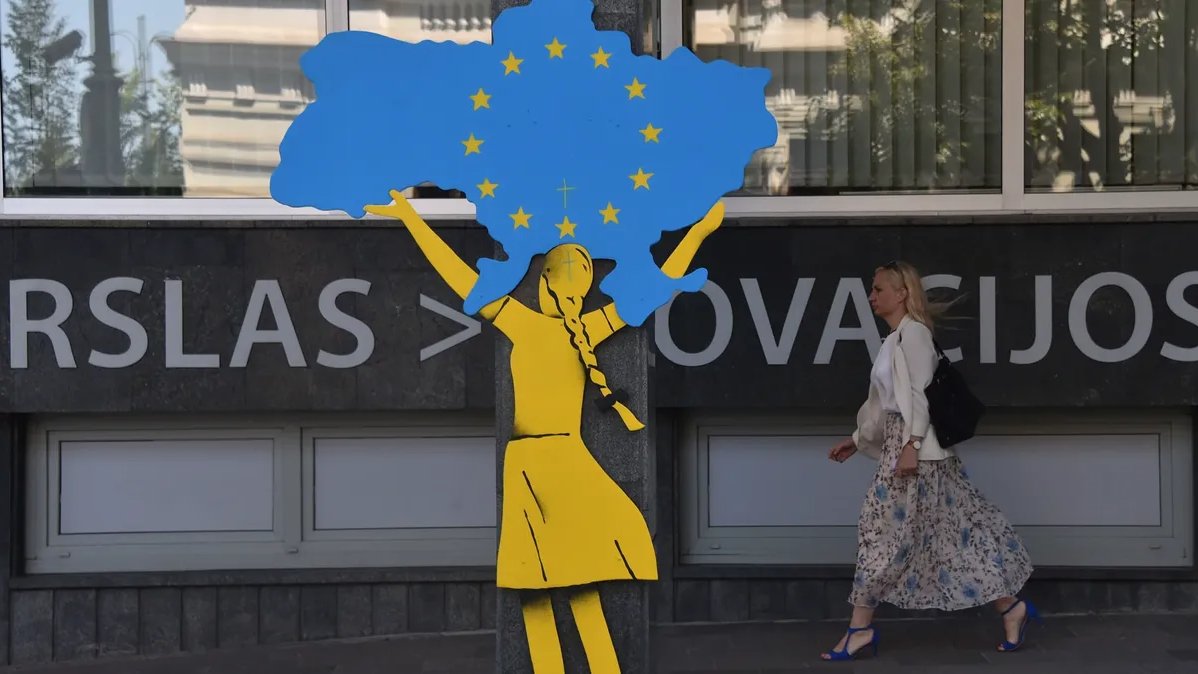The Lithuanian parliament voted in May to designate Russia as a terrorist state and blocked cargo transit via its territory to the Kaliningrad region in June. Then the European Union compelled Lithuania to unblock cargo deliveries by rail, which only showed yet again that Vilnius is much more radical toward Russia and its leader Vladimir Putin than Brussels, Berlin, or Paris. This irreconcilable position also affects Russian-speaking residents of Lithuania, who are complaining about discrimination and the demolition of Soviet-era monuments. Journalist Ilya Azar has visited Vilnius and Klaipeda, where he met and spoke with both a parliamentarian, who threatened that Lithuania could take back Smolensk, and an activist sentenced to four years in prison for spying for Russia.
Bayraktar with love
Lithuanian journalist Andrius Tapinas and his online TV channel Laisves TV (translated as Freedom TV) have actively supported Ukraine since the start of the war. Along with his colleagues, Tapinas protested near the Russian embassy in Vilnius, helped Ukrainians exchange money at a good rate, and travelled to the Dnipropetrovsk region to deliver humanitarian aid. And then raised 330,000 euros in donations for research drones in just 16 hours at a request by the Ukrainian embassy to Lithuania.
Tapinas tells me that Lithuanian Internet users started half-seriously proposing back in spring that a tank or a fighter aircraft be purchased for the Ukrainian Armed Forces. The journalist thought over it for a while and then decided to raise donations for some “really serious weapon.” He met with the Lithuanian defence minister to discuss the matter, and they eventually settled upon the famous Turkish combat drone Bayraktar.
Firstly, Tapinas says, this drone is relatively not that expensive (about 5 million euros), secondly, it is manufactured by a private company, which means it would be easier to reach an agreement with it, and thirdly, the Bayraktar has become nearly a cult object in Ukraine. Indeed, Ukrainians are recording songs about the Turkish drone or giving its name to dogs or even a lemur at the Kyiv Zoo.
Tapinas expected to raise 5 million euros in three weeks, but he managed to consolidate the whole sum in less than four days. However, Baykar Makina, the drone's manufacturer, declined to accept the money donated by Lithuanian citizens and simply gave one drone to Ukraine. After that, Tapinas transferred 1.5 million euros to the Lithuanian Defence Ministry to purchase missiles and bombs for the Bayraktar and spent the rest of the sum, in particular, on 110 anti-drone guns, 80 radars for them, and medical support for three hospitals in Cherkasy, where wounded Ukrainian soldiers are receiving medical treatment.
Tapinas dubbed the Bayraktar “the assassin of the Russian army” and the anti-drone guns “Orc-Slayers” on his social accounts. When I ask him whether it might be more becoming to a civilian person to crowdfund humanitarian aid rather than lethal weapons, he retorts, “Bandages or medicine haven’t won a single war. Weapons win wars. The sooner this war ends, the less money will be needed for humanitarian aid and for the treatment or guardianship of children who lost their parents. The only way to put an end to this war sooner is for Ukraine to receive more good weapons.”
The journalist says that Lithuanians are a peaceful nation, but those women, senior citizens, and even children who donated their money to buy the Bayraktar have said they "want the war to end sooner."
A total of 250,000 Lithuanians have chipped in for the drone, mainly donating small sums, the largest contribution being 30,000 euros.
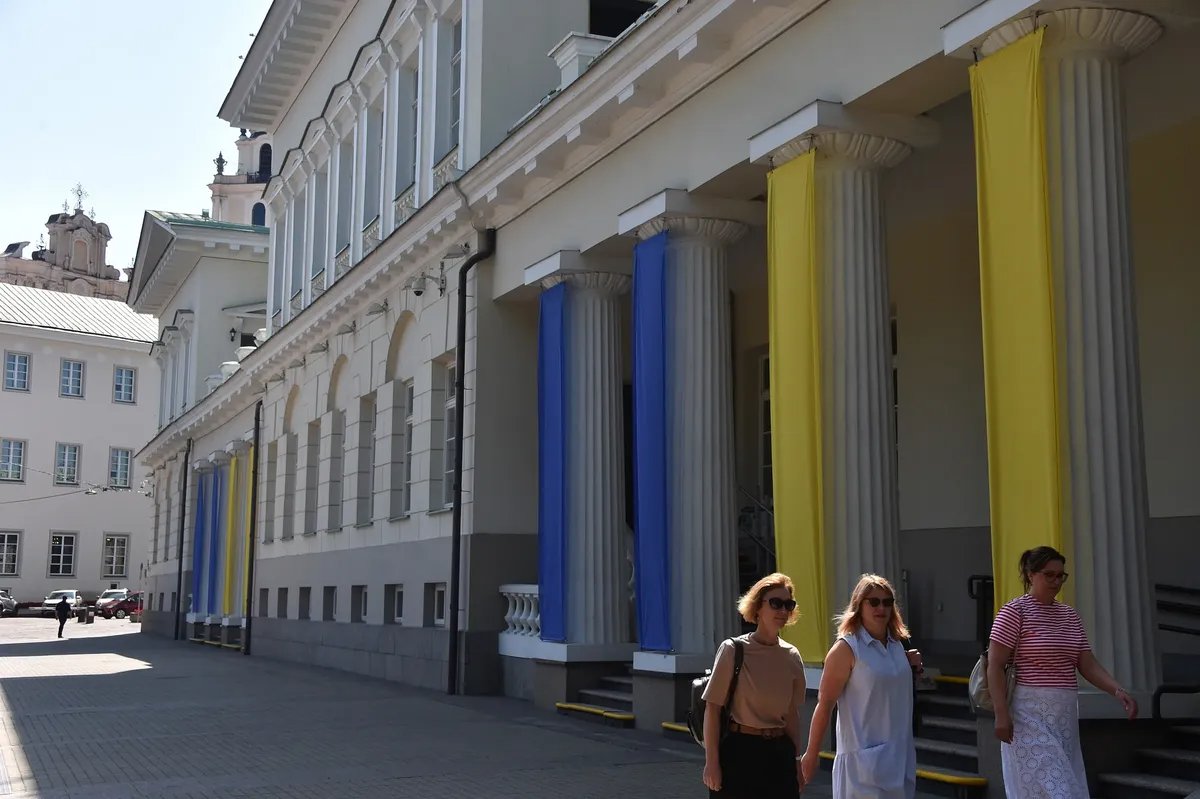
Vilnius. Photo by Vasily Maksimov, exclusively for Novaya Gazeta. Europe
Tapinas understands that one Bayraktar will not change the course of the war and will not instantly secure a victory for Ukraine, but his goal was different. "We managed to ensure that this campaign made the headlines all over the world. Having seen what we did, people crowdfunded the Bayraktar in Poland and then in Ukraine itself. If ordinary people in such a small country managed to do that, the governments should also make proper decisions," he said.
Echo of ducal wars
The Lithuanian army is not rated among the strongest ones in the world, and so its direct assistance to Ukraine is not that impressive: by June, Vilnius had supplied Kyiv with twenty M113 armoured personnel carriers, heavy mortars, FIM-92 Stinger man-portable air defence systems, trucks, antitank weapons, and various munitions.
Lithuania is making up for the lack of military assistance by its moves in the ideological, media, and diplomatic fronts. For instance, the Lithuanian parliament voted in May 2022 to officially designate Russia as "a state sponsor and perpetrator of terrorism" and recognise Russia's actions in Ukraine as genocide. Besides, Lithuania has absorbed twice as many Ukrainian refugees as the neighbouring Latvia or Estonia, and support for Ukraine is also more noticeable here, with blue-and-yellow flags and graffiti seen everywhere in the streets.
"Lithuania is supporting Ukraine morally and politically so much because it views it as an offspring of the Great Duchy of Lithuania. We think our faith and our civilization have had some influence on it," says historian Algimantas Kasparavicius. "Honestly, who [if not we] created Ukraine? After all, Ukrainians are very different from Russians. A Russian person – well, not all of them, but in general – has a vertical thinking, while a Ukrainian an anarchic thinking. The division occurred when Ukraine was part of the Duchy of Lithuania," says Matas Maldeikis, a member of the Lithuanian Seimas (parliament).
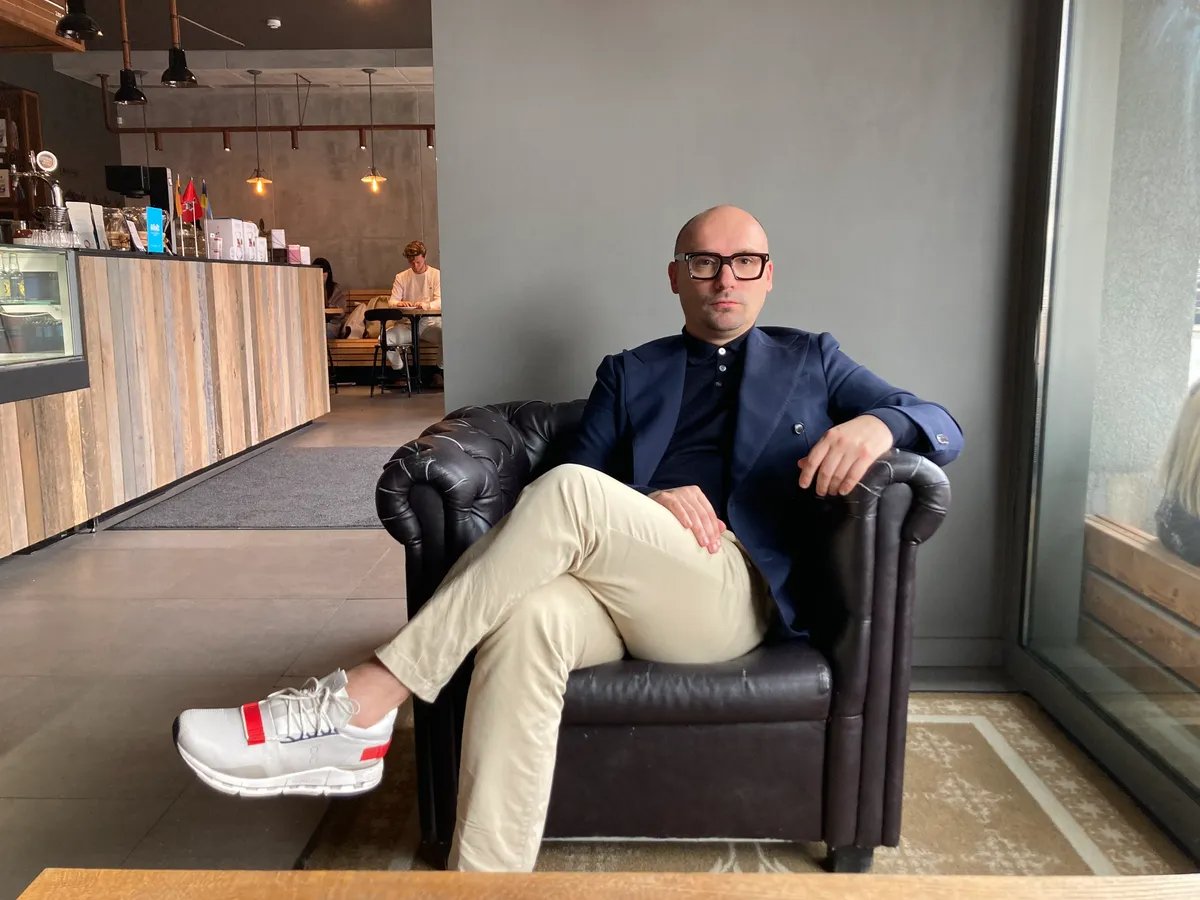
Matas Maldeikis, member of the Lithuanian Seimas. Photo by Ilya Azar
Asked about reasons for Lithuania's special attitude toward Russia, Kasparavicius refers to old times. "Some 15% to 20% of the one million books stored here deal with our rivalry with Russia," reasons the historian, with whom we meet at the National Library of Lithuania. "In fact, the question was about who would be the ruler of All Russia and who would gather up Russian lands. Ivan III, a grand-grandson of Vytautas, the grand duke of Lithuania, or Lithuanian dukes? At times, rivalry with Moscow stayed within the boundaries of routine geopolitical competition, like that between France and England, but sometimes it adopted the shape of mutual feud and hatred."
He recalls the words Patriarch Hermogenes uttered addressing the invaders during the Polish-Lithuanian occupation of Moscow in the early 17th century. "He said: 'Why are you threatening me? I fear only God. If all of you, the Lithuanian people, abandon Muscovy, I will bless the Russian militia to leave Moscow, but if you stay here, I will bless everyone to stand up against you and die for the Orthodox faith'. But all of his opponents spoke Polish. This is sub-conscience. After all, Moscow at the time confronted not Lithuania, but Rzeczpospolita [the state that appeared following the unification of the Kingdom of Poland and the Grand Duchy of Lithuania in 1569]," says Kasparavicius, pointing out that, in just about 30 years, Russian forces took Vilnius, which was the first time that "the city was invaded by foreigners."
He says Lithuanians remember well that, following the partition of the Polish-Lithuanian Commonwealth, when Lithuania fully came under the reign of the Russian tsar, two-thirds of its monasteries and half of its Catholic churches were closed over the next 100-year period.
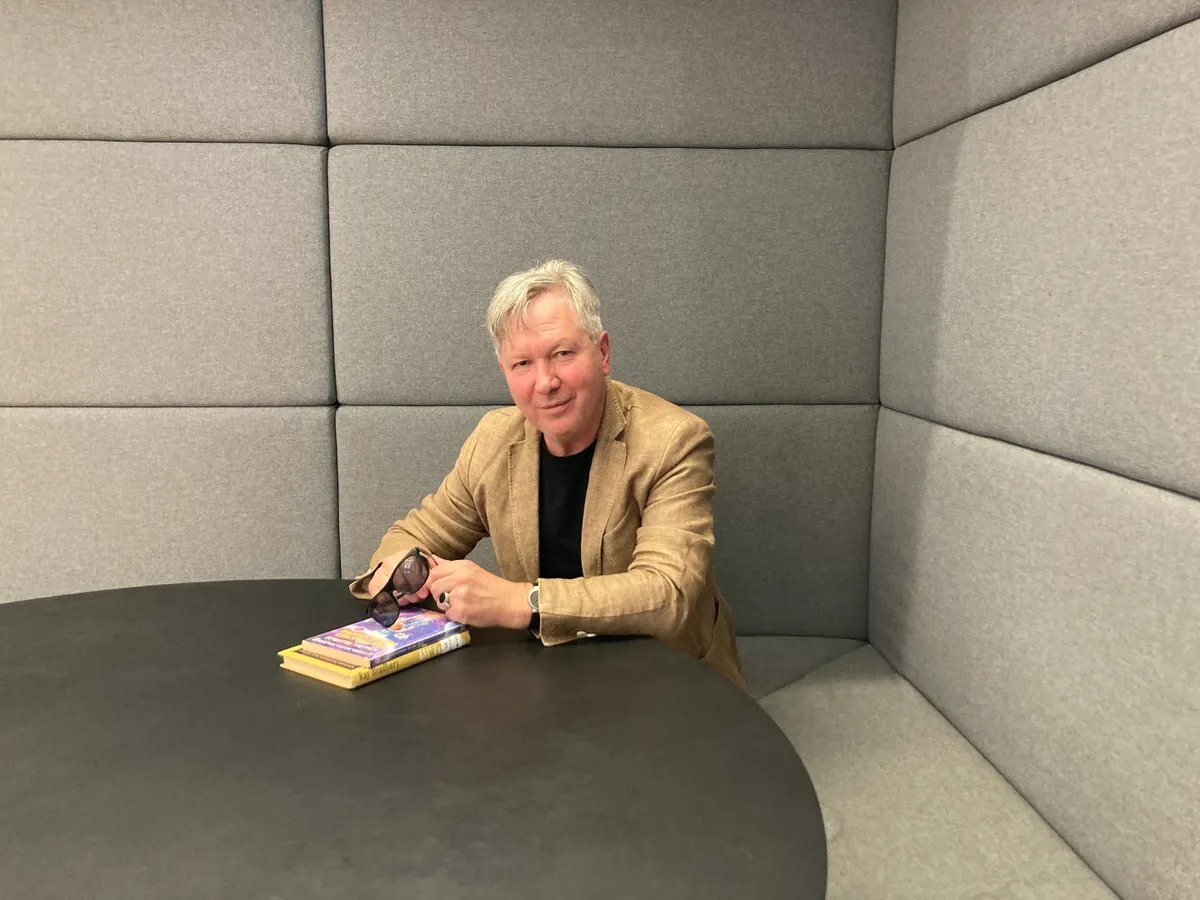
Historian Algimantas Kasparavicius. Photo by Ilya Azar
"Lithuanian-Russian rivalry is still not gone. No surprise that Lithuania, which feels itself part of the Western world, wants to take some revenge now. The same is happening with the United Kingdom, where policymakers said openly at the start of the Ukraine war that they would replay the 19th century history and kick [Russia's] ass. Both London and Vilnius are acting based on their historical experience now. The Lithuanians bear a certain cultural or even civilizational code, which cannot disappear just like that," Kasparavicius said.
Political scientist Rima Urbonaite explains the firmness of Lithuanian resistance to Russia by more recent events. "Take a look, for instance, at my biography: my mom was born in Siberia, because my grandpa and grandma had found themselves there against their will. My granny was put in a train car literally in a summer dress she was wearing at the moment," she says.
Over 130,000 Lithuanians were deported to Siberia after 1941. Kasparavicius insists, however, that some other Soviet republics were repressed no less harshly, and therefore, "Lithuania's current leadership in shining armour against Putin's regime" is determined precisely by older history and the fact that children read in their school textbooks about Vytautas's and Algirdas's victorious Moscow campaigns.
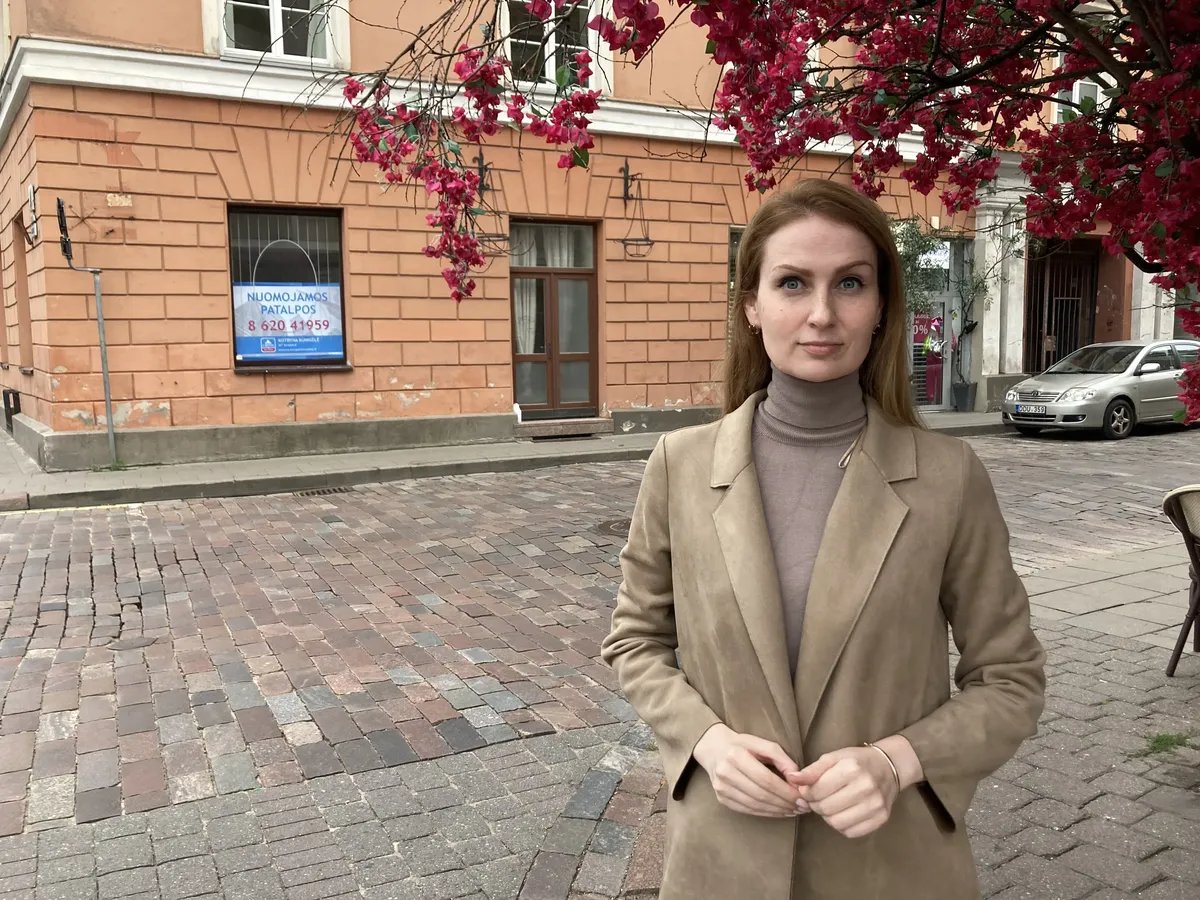
Political scientist Rima Urbonaite. Photo by Ilya Azar
"Smolensk is ours"
Kasparavicius believes that a special attitude toward Lithuania is also widespread in Russia. "An overwhelming portion of the current Lithuanian elite viewed Putin as someone threatening both Lithuania and the entire Western mentality, mindset, and freedoms. But Putin also viewed modern Lithuania and Poland as enemies," says Kasparavicius. "Putin's Russia made November 4, 'day of liberation from Polish-Lithuanian invaders', one of the main national holidays. It's only later that the Kremlin ideologists decided to omit a small Lithuania so as not to turn the holiday into a caricature."
Indeed, the latest version of the TASS news agency's background reference to Day of People's Unity does not mention Lithuania at all.
Perhaps historian Kasparavicius is right. Otherwise, how else can you explain it that Matas Maldeikis, a Seimas member, really rose to stardom in Russian media in early June? They just could not ignore his sarcastic tweet: "If Russia revokes her 1991 recognition of Lithuania's independence, Lithuania will revoke the 1634 Treaty of Polyanovka and demand that Putin submits to the authority of Władysław IV and returns all occupied territories to the Grand Duchy. Smolensk is Lithuania!" He was referring to a bill that Yevgeny Fyodorov, a parliamentarian of the United Russia party, submitted to the State Duma in June.
Russia's main propagandist Vladimir Soloviev, speaking in his show on Russian TV, referred to Maldeikis's remark as 'croaking' and, in his typically obnoxious manner, invited the Lithuanian parliamentarian to "try to come and get" Smolensk. "I would explain this overreaction [to Lithuania's actions] from Russia, especially from its Foreign Ministry, by complexes," says political scientist Urbonaite, who was introduced to me as sort of a local edition of Ekaterina Schulmann.
"My tweet is not Russophobic and not anti-Russian. Its goal is different," Maldeikis tells me. "I tried to show the absurdity of the entire [Russian] discourse, because the West doesn't quite understand what contemporary Russia is about. The West still thinks that Russia's statements are mere propaganda and you can sit at the table or make a call, like some leaders do, and agree on some rules that would satisfy both sides. But that's not the case."
He is sure that this is a typical case of someone starting gradually to believe in the ravings he utters himself, and all residents of Russia are vulnerable to it.
"I got messages from people in Smolensk who liked the idea, and there were others who didn't like the idea. But all of them live in the paradigm that they must take Ukraine, Moldova, the Baltic countries, and so on, and therefore, they believe the Smolensk thing, as well," Maldeikis explains to me, and adds, "What the heck do we need that Smolensk for?"
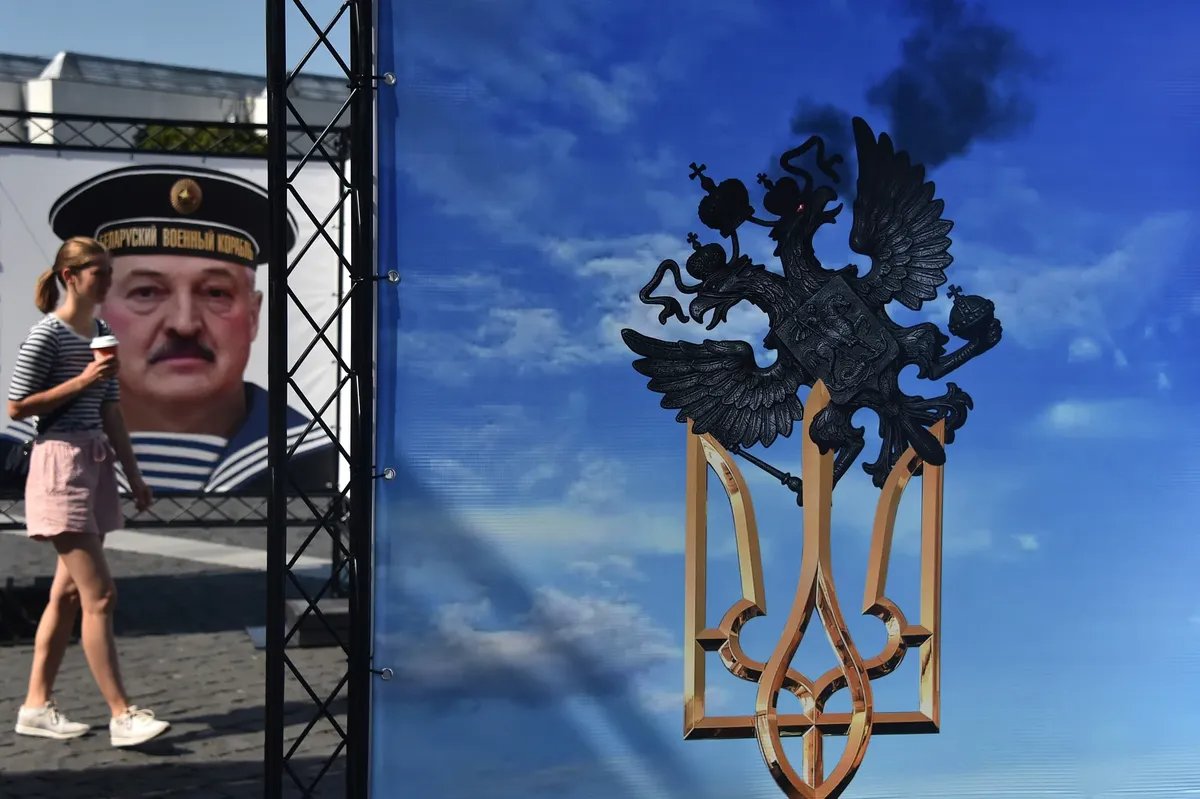
An exhibition of political posters by Belarusian artist Vladimir Tsesler on Town Hall Square, Vilnius. Photo by Vasily Maksimov, exclusively for Novaya Gazeta. Europe
The West has set up multiple institutions that are supposed to counter Russian propaganda, says Maldeikis. "They decided that if they keep telling the truth, the Russian people will learn it and start thinking for themselves. But it doesn't work that way! Russians have long been... well, I don't like the word 'zombified', but they've been perfectly vaccinated by the Kremlin against the truth. You can't prove anything to them, and so I wished to elicit a shocking response from them: 'What Smolensk?! That's absurd!' Then there is a chance that the vaccine might fail," he says.
Maldeikis reasons that the Kremlin, Vladislav Surkov, and others have unleashed the old idea of the Third Rome from the guts of the average Russian. "This missionary attitude mixed with the complexes that Russia will never catch up with the West produces a horrible Molotov cocktail, which is actually what Russia is now," he says.
Anti-Russian vanguard
Lithuania officially announced on April 2, 2022 that it had completely ceased to buy Russian gas. "From this month on – no more Russian gas in Lithuania. Years ago my country made decisions that today allow us with no pain to break energy ties with the aggressor. If we can do it, the rest of Europe can do it too!" Lithuanian President Gitanas Nauseda declared on Twitter.
Lithuania was able to do it because it had invested in the construction of a floating LNG terminal in Klaipeda long before. It cost some 100 million euros, but it was worth it. Now Vilnius looks down on other countries which, as Urbonaite put it, 'got addicted to gas' from Russia and are horrified now to think what they would do in winter if Russia cuts off gas supply. "We had lots of protesters here saying it was too costly and stuff, but now we have this moral reason: 'Folks, we knew whom we dealt with, and we did it'," Urbonaite said.
Lithuania is actually no stranger to an illuminator role: it has long been beating down doors in European capitals in trying to explain that no business can be done with Moscow.
Tapinas recalls that, as far back as 2014, then President Dalia Grybauskaite described Russia as a "terrorist state," but few European leaders were willing to agree with her at the time.
"Our loud voice has always been there. In some respects, we acted kind of hysterically, and so we were looked at as if we didn't understand something, but that's because no one else in the West has such traumatising memories about Russia," says Urbonaite.
"After Crimea, [European politicians] would come to us and say, 'How right you were!' And we replied to them: 'Oh, really! Good day then!'" sarcastically adds parliamentarian Maldeikis.
Mikhail Maglov, a journalist from the Proekt publication, points out that Lithuania has kept trying to persuade Europe that Putin is evil much more insistently than even Latvia and Estonia, because the latter have made money off the Russian regime. "In Estonia, they've worked with money linked to Moscow Deputy Mayor Maksim Liksutov, and numerous Latvian banks have laundered Russian cash, as well. If you take a walk around Jurmala with a real estate register, you'll see that the number of corrupt officials, their relatives, and figureheads owning homes there is simply off the charts," he says.
Europe did not learn the lesson, and therefore, journalist Tapinas is sure that Lithuania should keep explaining to Europe again and again how the war broke out and why, and why no consensus can be achieved with Russia. "The next day after the grain deal was signed, Odesa was attacked. And [UN Secretary-General Antonio] Guterres was shocked again. All Western politicians were shocked. But we weren't shocked at all. We understand that anything that Russia signs isn’t worth the paper it's printed on," he says.
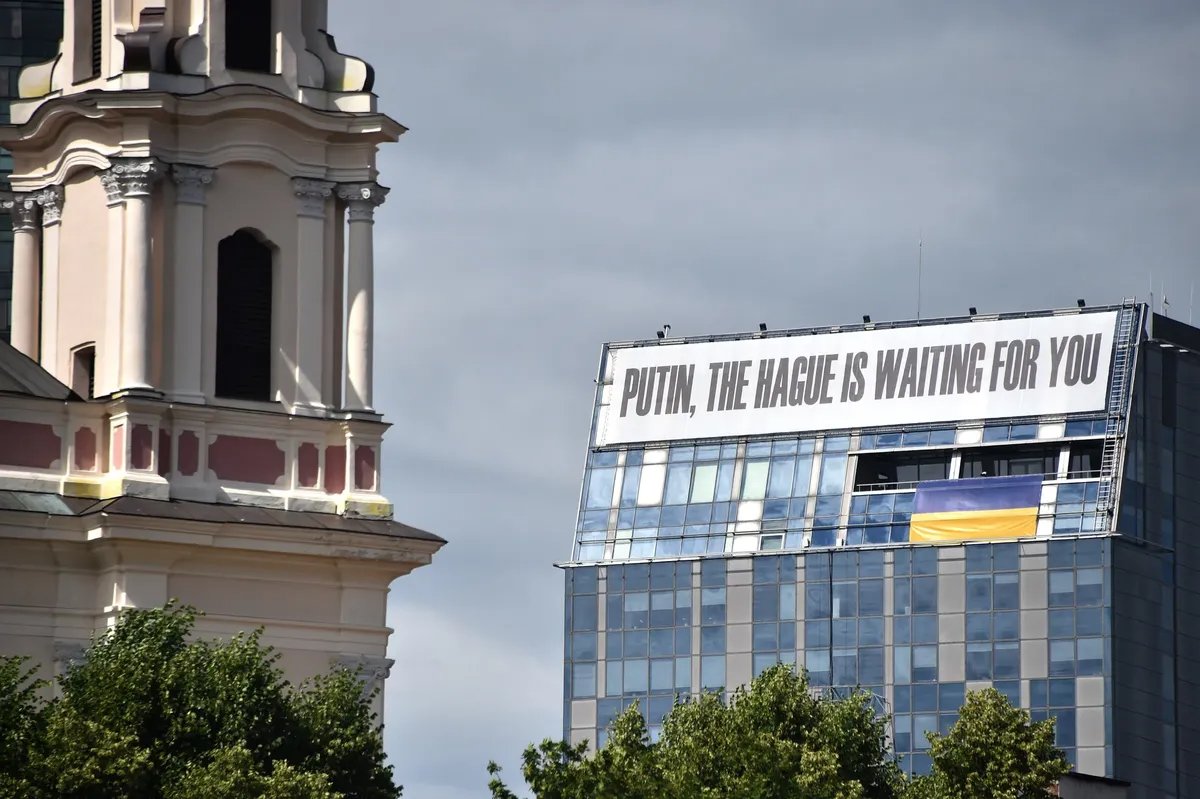
Vilnius. Photo by Vasily Maksimov, exclusively for Novaya Gazeta. Europe
Maldeikis says everything is changing because those who are currently in the Lithuanian government were children in the 1990s, and they remember very well what happened then. "We sat in front of the TV and watched our independence being crushed by tanks. Everyone remembers that the West told us then to be quiet so as not to harm Gorbachev," says the parliamentarian, who was born in 1980. "We have retained that romantic understanding that the world is not only Realpolitik and that ideals ultimately win."
Maldeikis travelled to Bucha shortly after Russian troops had left it, but he says he was not particularly stunned by what he saw there.
"I had realised what was about to happen, and I looked at it more calmly than most of the Lithuanians who suddenly walked out of postmodernism into reality. After all, [Russian soldiers] believe that they kill for a good cause. Why be surprised if they had come to Lithuania and raped women and then killed them in 1940? We've seen that, it's the same process. Nothing is changing in that country. We are beginning to live in a postmodern era, while mentality in Russia hasn’t changed since the Middle Ages," says Maldeikis.
He assumes that countries like France and Germany, which are protected from Russia by buffer countries, hope that Russia would break up on its own, as the Soviet Union once did. "Russia is an existential threat now, and it must be stopped. The West's problem is that it thinks that, if it can reach some consensus with Don Corleone, he would be satisfied. But he won't be satisfied because he understands that the collapse of the Russian model is just a matter of time. Russian authoritarianism cannot survive because it cannot be reformed and because any reform in Russia, where everything is divided between clans, ends up in misbalance and turmoil. Russia is stagnating and beginning to rot. And so Putin is fighting not even Europe or the West, but he is fighting time, and nobody has been able to defeat time yet," he says.
Cargo transit and Realpolitik (5490)
In June, Lithuania completely blocked cargo transit between the Kaliningrad region and the rest of Russia via its territory, explaining this by the need to abide by the EU's new package of sanctions on Russia over the war in Ukraine. Steel, cement, and other sanctioned goods stopped being delivered to Kaliningrad. That infuriated Russia, and its Foreign Ministry labelled Lithuania's decision as "openly hostile", warning that "Russia reserves the right to act to defend its national interests." Lithuanian President Nauseda responded that Lithuania would not agree to any compromise.
After the European Commission's intervention (some media wrote that Germany tried especially hard), Lithuania had to give in, and railroad transit was resumed. "As concerns the transit, our government scored an own goal, enabling Russian propaganda to speak of Lithuania as a loser. That was a communicative setback, but it is not very important, because the sanctions will keep being tightened anyway," Tapinas says.
"When the 4th sanction package was being cleared, Lithuania pressed the European Union to specify whether it applied to transit goods, and Brussels answered unambiguously that sanctioned goods cannot enter. The European Commission should not change what has been agreed upon between the EU leaders," insists Maldeikis, who sees Europe's conduct as a classic example of Realpolitik.
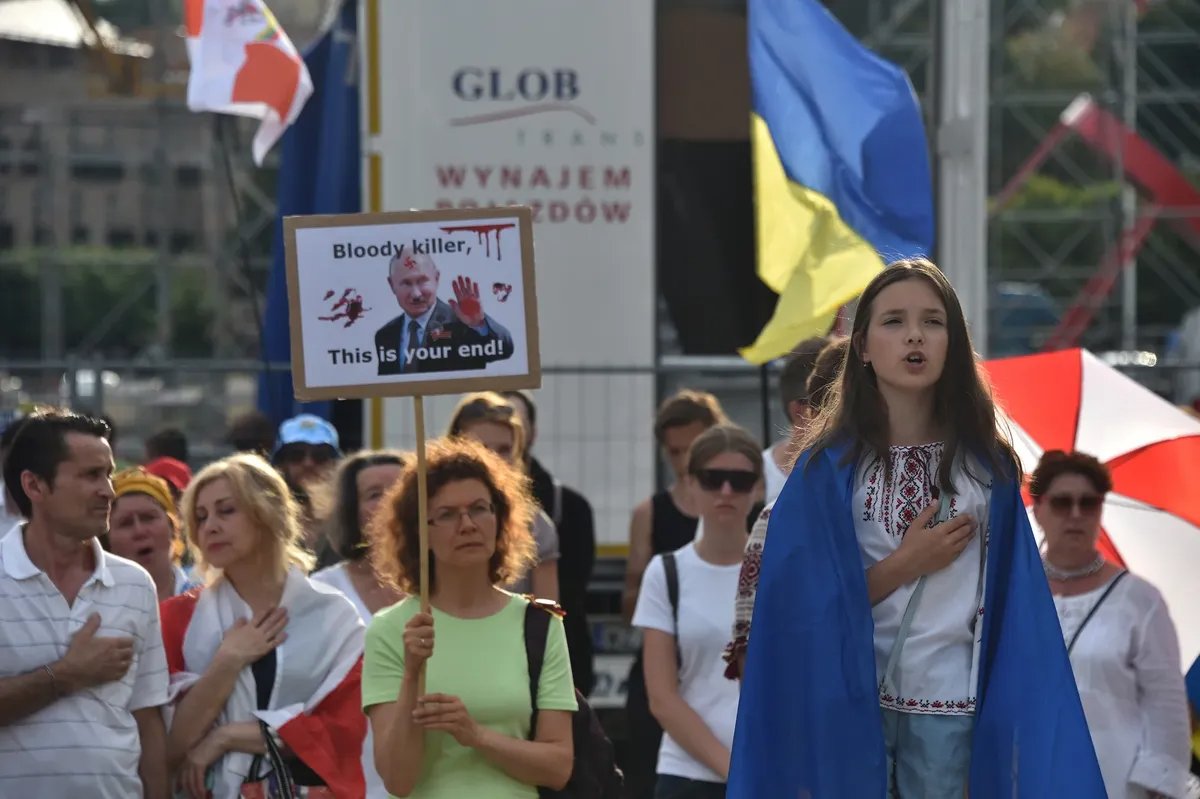
Demonstrations in support of Ukraine held each Monday on Cathedral Square in Vilnius. Photo by Vasily Maksimov, exclusively for Novaya Gazeta. Europe
Political scientist Urbonaite is of the view that Western Europe has routinely made mistakes while interacting with Russia. "A lot of things were not to be ignored and soft-pedaled, especially when you heard a president speak in street language and say something about who should punch first. I was told: 'Well, but Rome is Realpolitik, isn't it'. But I've always counter-questioned to that: Is this Realpolitik indeed, considering how many times it's happened [Russia has broken agreements] since 2008? It looks like Realpolitik has been granted a leave all this time and the West has badly miscalculated."
She sees that the West keeps shooting itself in the foot, which angers her. "I don't quite realise Germany's position on Kaliningrad. And I don't understand Macron with his telephone psychotherapy, either. I don't even mention his remark that Russia shouldn’t be humiliated because it has to save face somehow. Why save the face of a man who has distorted his face himself so much there's nothing left there?" She cannot understand what to negotiate with Russia about, while at the same time she is worried that Western Europe is inclined precisely toward this. "It seems to me there is the danger of some tiredness [of the war], and then it might end up badly."
Journalist Tapinas points out that this is exactly why the Kremlin has invested so much in Western Europe. "They bought politicians, they put their people on boards of directors, financed various funds, organizations, trade associations, and so on. And all of that has yielded dividends. We hear through these people what the Kremlin is trying to convey: 'Let's make a deal sooner, let the borders remain as they are now, but there'll be peace'," he says.
Natural gas is the main reason why Europe might be getting 'tired' of the war: voters in France or Italy are already unhappy that they are incurring losses (and they are frightened to think what is going to happen in winter), but the governments are seeking to retain their loyalty. Growth in prices for petrol, electricity, and food has "reached an unacceptable rate" in Lithuania, as well, but the Lithuanians are not lamenting – whether it is because they do not depend on Russian energy, or owing to historical memory. "Perhaps the government will be replaced in the next elections because of this, but I think most of Lithuanians would say they are ready to pay more if this could advance Ukraine's victory and lessen the threat from Russia," Tapinas said.
However, some in Lithuania itself say that the West treated Putin too harshly and disdainfully and shares the blame for what happened on February 24.
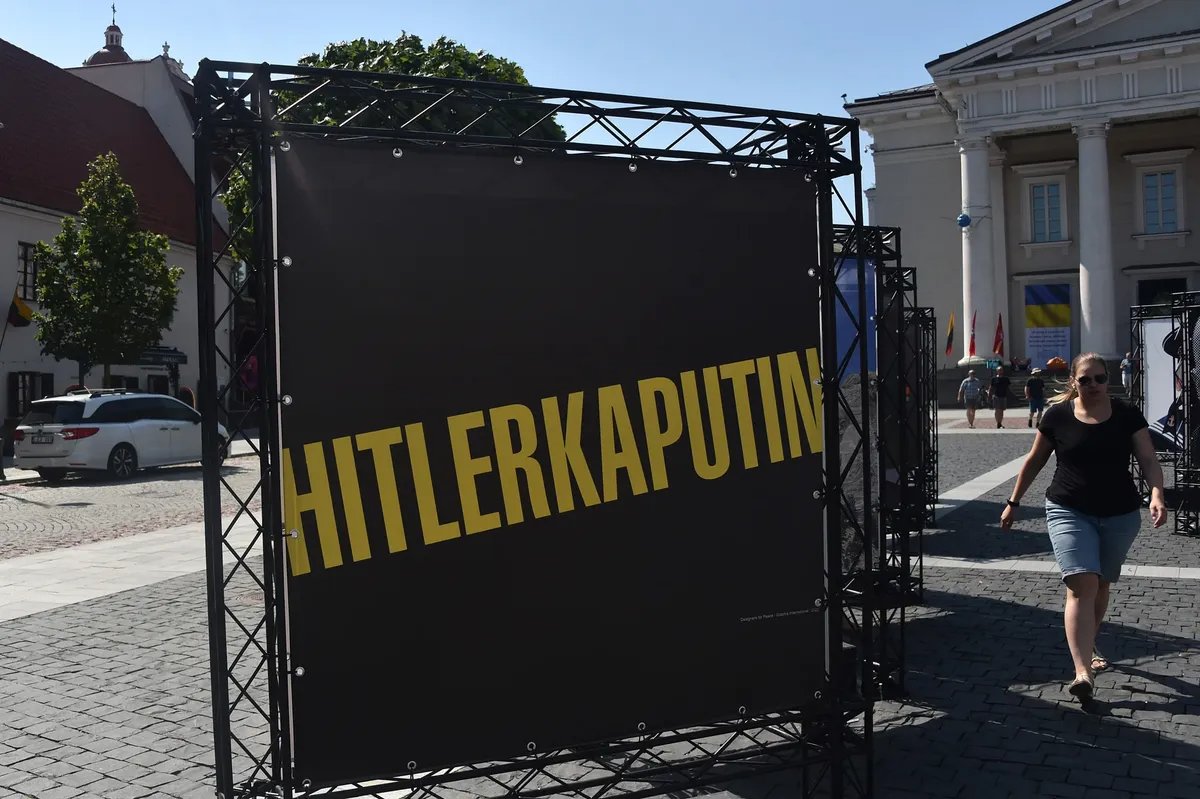
An exhibition of political posters by Belarusian artist Vladimir Tsesler on Town Hall Square, Vilnius. Photo by Vasily Maksimov, exclusively for Novaya Gazeta. Europe
"There can be no such a situation in which one party is to blame for everything and the other is squeaky-clean. Part of the blame for the emergence of someone like Putin in Russia rests, in particular, with Lithuania, as well as all of the West. When Lithuania joined the European Union and NATO in 2004, there was no such bitter opposition on the Kremlin's part. But the concept of inviting the other former Soviet republics crossed some red lines. Was the game worth the candle?" Kasparavicius asks rhetorically. "The West is partly to blame for the fact that Putin has been in power in Russia for more than 20 years, because the West has never given him a break so that he could go, and it has always pressed him."
Kasparavicius believes that Putin was waiting for a moment of stabilization to hand over his power to a successor, but that moment never came, and now he "has no such thoughts anymore."
"The West has been moving forward all the time, and Putin saw himself as a messiah of the Russian people, who is destined to resolve this historical problem," he said.
Kasparavicius recalls the time in the late 1990s when he worked at archives in Russia and lived at the Lithuanian embassy in Moscow.
"I had a chance to attend a couple of events where Lithuanian diplomats posted in the West would meet over a cup of tea or a glass of wine and place bets on how long Russia would yet be able to hold out: five, or ten, or fifteen years," he says.
"And what did you bet on?"
"I didn't, but that was quite a hard time indeed. I remember walking down Arbat Street in winter and seeing bums sleeping on ventilation pipes. As a historian, I could imagine such things only during a civil war," Kasparavicius said.
NATO won't come immediately
"If you read Lithuanian press, you could hardly find a newspaper or a web portal that misses even one day to write how Russia threatens Lithuania," historian Kasparavicius says.
In June 2022, Estonian Prime Minister Kaja Kallas expressed the essence of the worries shared by the Baltic states, which belong to NATO and are therefore protected, at least on paper, by Article 5 (Collective Defence) of the North Atlantic Treaty. She said that her country would be "wiped off the map" if invaded by Russia, as NATO's plan envisions the capture of the Baltic countries by Russia and their subsequent liberation no sooner than in half a year.
"You know that, indeed, there is NATO and Article 5, but on the other hand, you understand: 'But what if...?' All these years, Lithuania and the other Baltic countries have been held at gunpoint. We even were prevented from traveling to Siberia to take care of the graves. Lithuania has no escape routes like Ukraine does now, and its geographical position offers few options [Lithuania borders mostly the Kaliningrad region of Russia, Belarus, and Latvia, and plus it has a very short common border with Poland]. I wouldn’t like to exaggerate things and push the panic button, but you really can't understand where the red lines are for the Kremlin these days," Rima Urbonaite says.
She says she had told her mother as early as last summer where she should go in the event of war and what things she should have at home just in case.
"I know for sure that I won't go anywhere, but I started worrying about my kin. What's worst is that you don't know what exactly to prepare for and you can't predict what happens next. If the Russian leadership doesn't care even for its own people, this means there are no limits for them, and therefore, we need maximum security," she says.
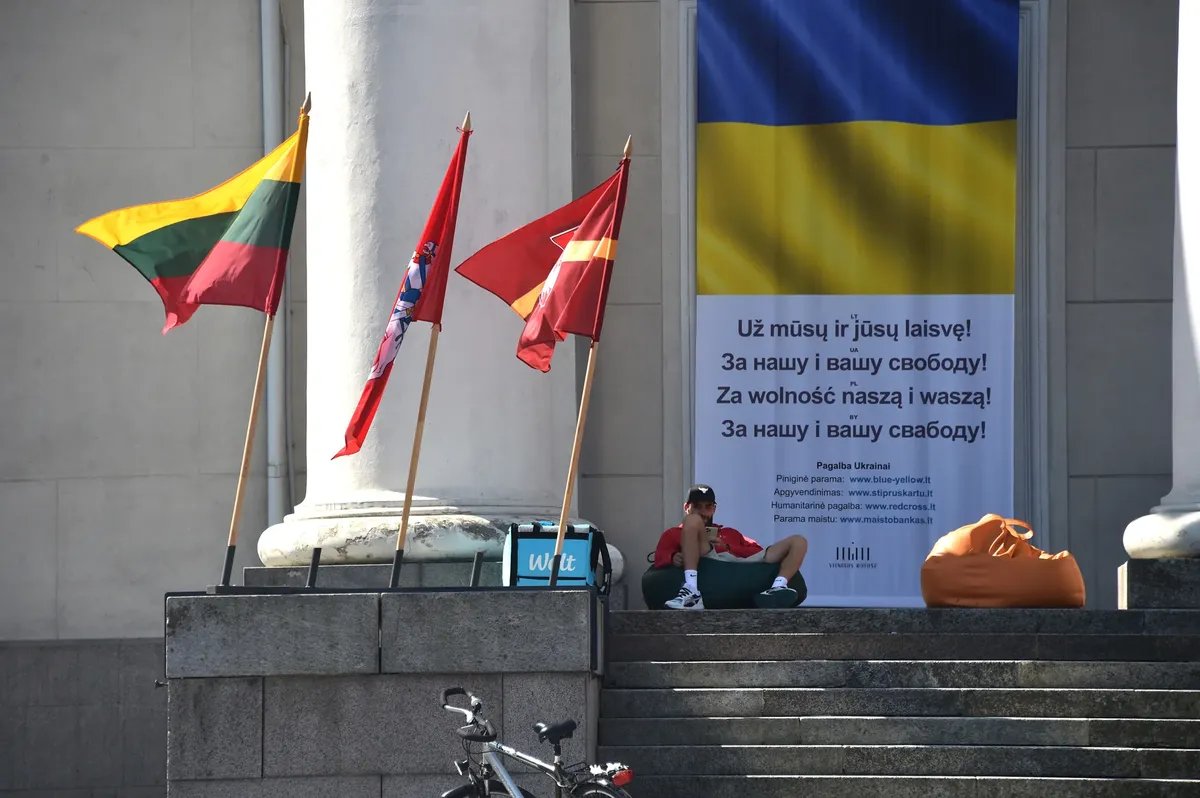
Vilnius. Photo by Vasily Maksimov, exclusively for Novaya Gazeta. Europe
"You mean build bomb shelters?" I ask.
"That's right, and by the way, we have a problem with that," Rima replies absolutely seriously.
She says that, when the war started, many people took leaves for a week or two and departed Lithuania to see how the events unfold.
In historian Kasparavicius's view, the danger is real, as Lithuania is squeezed between Russia and Belarus: "This geopolitical discomfort affects Lithuania's rhetoric, wellbeing, and security."
Parliamentarian Maldeikis insists, however, that Lithuania is not afraid of invasion. "Why did we rush so much to join NATO and the European Union? Because we understood that we had a small window while Russia was the way it was then [in the 1990s]. This is not fear. We simply lost too much, and each of us has relatives who died in Siberia. We simply can't fear anymore. Our vaccine against Russia is [the ability] to speak out," he says.
Therefore, Maldeikis disagrees that Lithuanian parliamentary resolutions or his provocative tweets increase the risks of a war against Russia.
"I am absolutely sure that the Kremlin has an [invasion] plan for Lithuania, Latvia, or Moldova. Ukraine is just an episode, and if it loses, others will follow. And the plan doesn’t depend on whether I write a tweet or not," he says.
"Why are you so sure that there's such a plan? After all, Lithuania is part of NATO."
"The Baltic countries are convenient to show that NATO doesn't work and that all of Eastern Europe must bow down to Putin, and if they don't, he will come and eat your kids. This follows from authoritarian logic. Having let his people taste blood, Putin can't stop anymore. This is the modus operandi of an authoritarian ruler. Of course, things here would be different from Ukraine, and we would see something more peculiar," Maldeikis said.
In his view, people in Lithuania would not even understand that a war is going on, referring to the 2014 events in Crimea as an example.
When Lithuania like the rest of the world saw that the Russian army cannot be called invincible, worries ebbed. "The Russian bear is always about a great deal of window dressing. It’s always been that way, but we can see it only now because of the Internet. It turns out that Russia's military doctrine is still the same: mamas will make more cannon fodder," says Maldeikis.
Journalist Tapinas insists that Russia "has manifested its impotence" and is unlikely to try to invade Lithuania now. "I am sure that Article 5 would be invoked, and if the Russian army still decides to confront a NATO army on the battlefield, I think everything is going to be very quick and very painful for the Russian Federation," he said.
An alternative way
Historian Kasparavicius recalls that Lithuania and Russia were not always foes, and their relations were quite good between the two world wars in the 20th century. "After the country's establishment and up to 1940, Lithuania did not have problems with the Bolsheviks. If you study various historical documents and diplomatic cables, especially on the Lithuanian side, you see that Russia was viewed as our ally in our struggle [with Poland] for Vilnius and for restoring Lithuania's territorial integrity," he says.
Lithuania's foreign policy in those years consisted in maintaining beneficial economic, geopolitical, diplomatic, and cultural interrelations with Soviet Russia, says the historian. "When France and Britain tried to set up a sanitary cordon against Bolshevism, something similar to NATO nowadays, this didn't work. As the Brits themselves admitted in their documents, the chain could not be closed because of Lithuania's position, the Lithuanian-Polish conflict, and Moscow's support for Lithuania's territorial ambitions," he says.
The National Library of Lithuania has a portrait of philosopher Stasys Salkauskis composed of books with white and black spines. This man, in Kasparavicius's words, was among those who laid the ideological and geopolitical foundation of Lithuania's statehood. "He came to the conclusion that Lithuania can exist as an independent state only as a bridge between the West and the East, maintaining good relations with both banks, no matter who is in the Kremlin, whether it's a tsar, or Kerensky, or the Bolsheviks," he says.
Antanas Smetona, Lithuania's president in 1919-1920 and 1926-1940, consistently followed this principle, he says.
"Judging by his speeches and correspondence, he believed that, if Russia turned fiercely against Lithuania, the latter would not endure it and would either have to be absorbed culturally by Poland or disappear completely," he says.
That is why frustration was so deep in Lithuanian society at the end of 1939, when Stalin demanded that a Soviet military base be set up not only in Latvia and Estonia, but also in Lithuania. "Lithuanian diplomats would tell their Russian counterparts at the time: 'How is that? They were not faithful to you, but you ranked us together with your enemies, Estonians and Latvians. After all, we've been cooperating with you all along, and now you've just betrayed us'," Kasparavicius said.
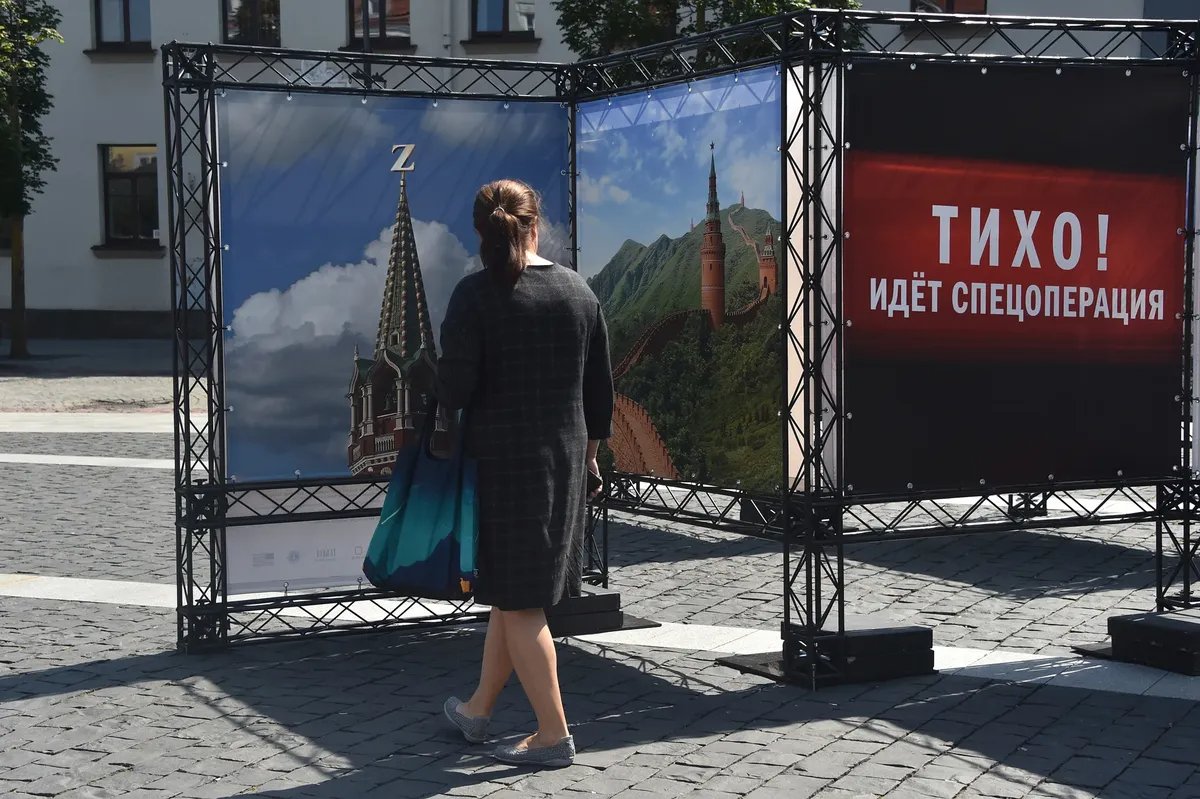
An exhibition of political posters by Belarusian artist Vladimir Tsesler on Town Hall Square, Vilnius. Photo by Vasily Maksimov, exclusively for Novaya Gazeta. Europe
After that, Lithuania "returned mentally to the times of Rzeczpospolita and the Grand Duchy, recalling that Russia could not be trusted," Kasparavicius says.
After Lithuania was incorporated into the USSR, all of its people rose up against Moscow. "For Lithuanians, Russians turned from strategic partners into traitors, who are punished harder than enemies. About 400,000 Lithuanians were involved in the guerilla underground from 1944 to 1953, which is quite a figure for Lithuania's three-million population," he says.
And yet, after the Soviet Union's breakup, Lithuania manifested its goodwill again. "Immediately after regaining statehood, [first Lithuanian President] Vytautas Landsbergis followed roughly the same cultural bridge philosophy," Kasparavicius says. Moreover, after intense debates, Lithuania ultimately granted citizenship to all who lived in the country at the moment when it became independent (Latvia and Estonia decided otherwise, and the former still numbers nearly 200,000 'non-citizens').
Truth be told, this was due in no small part to the fact that, at the moment of the USSR's breakup, only 10% of Lithuania's residents were ethnic Russians (who lived mostly in Vilnius, Klaipeda, and the 'Russian' city of Visaginas, a town built specifically for the Ignalina Nuclear Power Plant employees), while in Latvia and Estonia, those proportions were 40% and 30% respectively. "When this legislation was being adopted, the Latvians and Estonians hinted that they didn't like the position they would find themselves in, but Lithuania had enough political wisdom not to pander to its close neighbours," Kasparavicius says.
However, he is convinced that, in the past few years, the proponents of the geopolitical bridge philosophy have been losing ground in Lithuanian politics "slowly but surely."
"It would be safe to say that Putin, who started promoting great-power interests quite quickly and abruptly, supported the advocates of neighbourly relations in a way. The anti-Russian forces got Putin as the principal sponsor of their philosophy, which is now [prevalent] in Lithuania," he said.
Putin is not Russia
And yet there are politicians in Lithuania who think differently. "I belong to the people who engaged in dissent in Soviet times. I was a dissident, I was involved in underground activities, and I was arrested by the KGB. I know what dissent is, and Russia needs it badly now. But if we speak in the language of nationalism, chauvinism, and Russophobia here in Lithuania, we won't achieve anything. This is a path to nowhere," says Vytenis Andriukaitis, a prominent Lithuanian policymaker and cardiac surgeon. He is 71, he has been a member of the Lithuanian Seimas for six terms since 1992, and he has served also as Lithuanian health minister and European commissioner for health and food safety.
In his words, Lithuania's foreign policy has always rested on three pillars, that is, security (NATO membership), democratic rights (European Union membership), and neighbourly relations with its neighbours. "The third pillar has been broken now, and we need to do something about that," he says.
Back in 2016, Andriukaitis publicly spoke in favour of pursuing friendly relations with Russia, arguing that Lithuania should abandon its pervasive Russophobic policy and anti-Russian course. Six years later, Andriukaitis has to be making excuses. "Certainly, the geopolitical situation is absolutely different now, which has radically changed the opportunities for exploring more rational steps. Putin's regime has ripped apart all international rules of the game. There can be no foundation for vindicating Putin's disgusting neo-fascist policy and this military aggression," he says.
But even now, he has serious disagreements with the Lithuanian leadership. While Vilnius has halted the issuance of visas to Russian citizens, Andriukaitis has proposed building bridges – not with the Kremlin but with ordinary Russians.
"Putin is not Russia. We should clearly identify the part of Russia that doesn’t support Putin and could hopefully bring about more or less democratic changes. This way or another, the war will be stopped and Putin's crazy venture will fail one day, and we should not be afraid to have contacts with forces that do not fall completely for Soloviev's awful propaganda," Andriukaitis tries to encourage me.
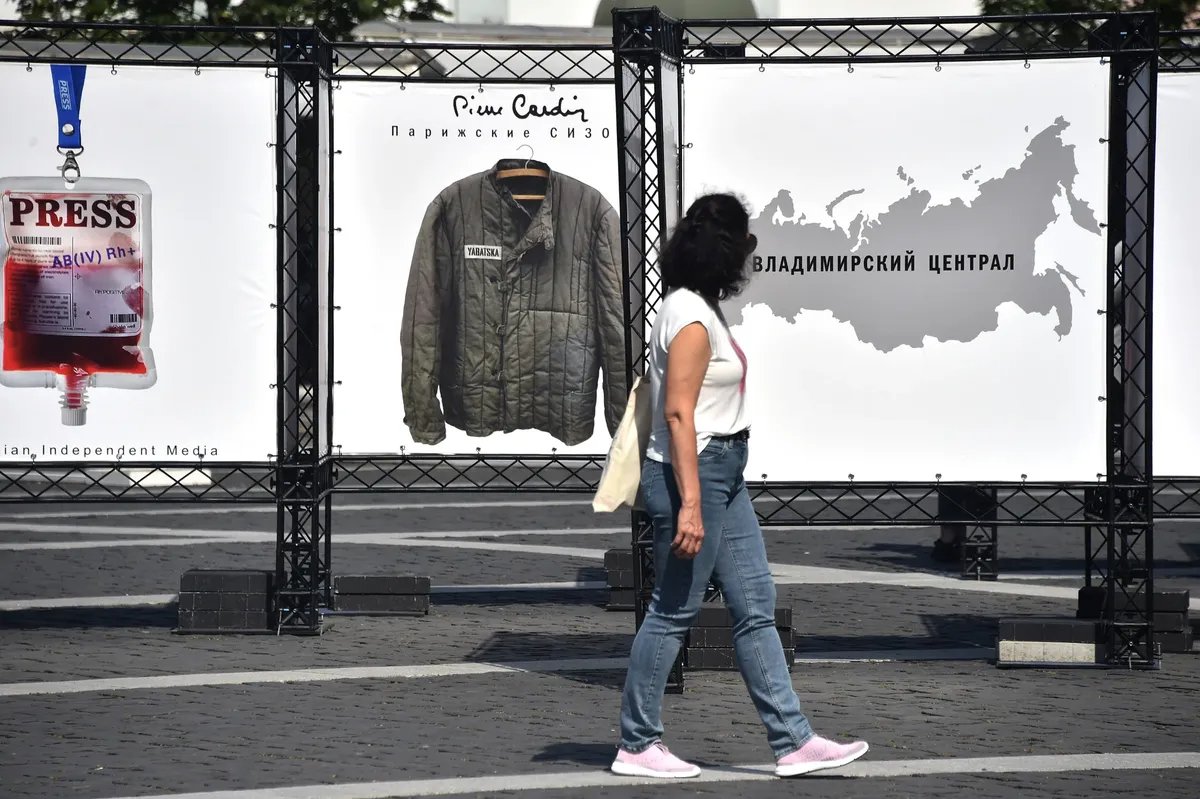
An exhibition of political posters by Belarusian artist Vladimir Tsesler on Town Hall Square, Vilnius. Photo by Vasily Maksimov, exclusively for Novaya Gazeta. Europe
"Over the past few years, I've been thinking increasingly more often that this makes no sense because the number of people who can hear and understand is not growing," I say sadly, but Andriukaitis does not give up.
"Let's recall Alexander Herzen. When he was leaving Russia, which he was doing via Lithuania, he anticipated hard work that lied ahead of him: to wake up Russian society, creating the Kolokol magazine, and to communicate an alternative view to Russian minds. Of course, this would take some time, but if even Novaya Gazeta is that pessimistic, what's next? On the contrary, we should try to create at least some tiny opportunities for dialogue between NGOs, intellectuals, academics, doctors, teachers. No matter how difficult that may be, there's no other way," the former European commissioner says confidently.
He even proposed launching a special programme for "Kaliningrad dwellers" so that they could travel to Klaipeda "to shop, to think, to talk."
"After all, that costs not that much, but it provides an opportunity to influence the opinions of ordinary people. Let them see for themselves that those who live here are normal people, not Nazis and rampant Russophobes," Andriukaitis said. He is sure it would be wrong "to answer to naked propaganda with naked propaganda."
Definitely, few in Lithuania share Andriukaitis's approach. For instance, journalist Tapinas, arguing with the former European commissioner in absentia, refuses to make any distinction between opposition-minded Russians and the Kremlin. "If a Russian person doesn’t share his country's policy, he has several ways to demonstrate this. They can take to the street for collective or individual protest. They can leave that country, but only a tiny fraction of them has done that! An overwhelming majority of them live in Russia and, so to speak, have it pretty good. I watch their propaganda channels so as to understand what they talk about there, and I see people who live their lives, smile, go to restaurants, and think where to travel for vacation," Tapinas says. "They have shut themselves off from the deeds being committed by their government. This position is nasty, and I cannot distinguish those who have chosen to stay and live in comfort in Russia from the murderous Kremlin rulers!"
Without naming names, former European Commissioner Andriukaitis insists that Lithuania should "avoid chauvinism, which may do a lot of harm to relationships between Lithuanian society and Russian society."
"Horrible nationalism should be abandoned, because this only leads to hatred between nations. I see that some of my friends don't even want to speak Russian now. This is stupid and barbaric! Ignoring the entire Russian cultural heritage is totally unacceptable," emotionally exclaims Andriukaitis.
Monuments and liberation
A gracefully aged woman is walking about the memorial to Soviet soldiers in Klaipeda and thoroughly studying the names of those who died in fighting for the city in January 1945. There is nothing more to look at here: the main elements of the memorial, namely the sculptures of three soldiers and a huge sword, were demolished and the eternal flame removed in July in line with the local self-government's decision.
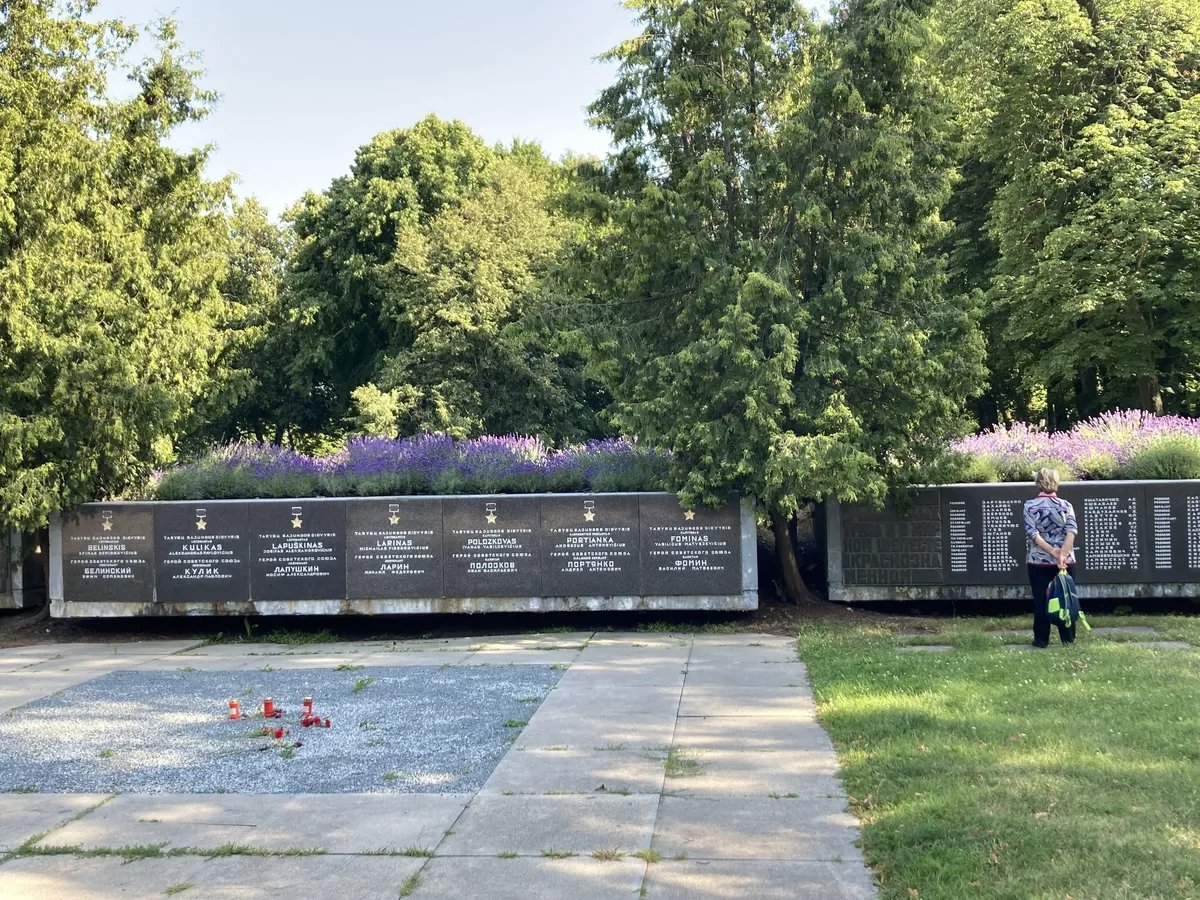
Memorial to Soviet soldiers in Klaipeda. Photo by Ilya Azar
"Here I am, came to look," Tatiana says. "Of course I don't like it that it's been dismantled. What was so harmful about it? I wish they hadn't touched the monuments to Lenin and Brezhnev, either."
I find out quickly that Tatiana supports "Putin's policy" and that the Americans supposedly built bio labs in Western Ukraine.
Vitalijus Juska, head of the Klaipeda self-government office for heritage affairs, explained the reasons behind the monument's demolition as follows: "We would like to return to the basic idea that the memorial should mark the burial site of those soldiers rather than serve Soviet Communist ideology."
This pattern has been followed by all those who support the dismantlement of Soviet monuments in Lithuania (this has happened regularly in al Baltic countries after the start of the Ukraine war).
The campaign for completely ridding Lithuania of Soviet legacy was also initiated by journalist Andrius Tapinas. "This should've been done long ago! Why should we have monuments to the army that invaded and raped us and that deported our best people? I always heard in reply that Russia shouldn’t be angered, but after the war was started, I decided that perhaps we shouldn’t really care about its opinion any longer."
That said, Tapinas insists that what needs to be demolished is "those very aggressive soldiers with automatic rifles and Soviet symbols," while the graves should not be touched.
Kasparavicius reasons carefully, "I consider myself a liberal and think that history should be accepted as it is, and it's no good rewriting it, or highlighting, or destroying something. Naturally, Lenin and Dzerzhinsky had to be removed, but there is a number of Soviet-era Lithuanian figures whose role can hardly be assessed definitively. I don't think everything needs to be removed to have a 'clean Lithuania'."
Of course, Andriukaitis does not support the demolition of monuments, either. Besides, he is worried that Putin "has actually usurped the victory over Nazi Germany."
"The blood of soldiers from all the 15 republics is on the altar of Nazism's defeat, but Putin has privatised May 9 and made it a cornerstone of United Russia's propaganda. What does someone like Zelensky have to do if he wants to do honour to his grandfather? He was a Soviet soldier who walked from Ukraine to Berlin. It takes delicacy and the understanding of historical complexity rather than unbridled patriotism," he says.
Lithuanian journalist Denis Kishinevsky, who was born and grew up in Klaipeda, views the memorial's demolition as an example of "local excesses."
"Soviet memorials in Lithuania are very different. Some of them are of no value. Just factory-made gypsum dummies. Especially those erected at places where they don't mean anything to 99% of local residents. But there are large communities in Vilnius or Klaipeda, not only Russian-speaking ones, for whom the memory of WWII or the Great Patriotic War does matter something."
Kishinevsky is convinced that the memorial in Klaipeda was of artistic value, and besides, he reminds me that the sculptor who created the figures of the soldiers set himself on fire in 1990 to protest against Lithuania's occupation. He says there was no unanimity in Klaipeda about the monument's demolition: more than ten members of the City Council voted against it, and public opinion polls showed that 40% of the respondents were opposed to doing anything to the memorial, although the share of people with Russian background in Klaipeda varies from 15% to 20%.
Kishinevsky insists that the demolition of monuments should not be tied to the Ukraine war. "It would have been appropriate to arrange public debates on reviewing the Soviet legacy a year before or a year after the war, but now it looks not very well. Little discussions and lots of emotions," he says.
A key difference between Lithuanians and Russians concerns their attitude toward the conclusion of WWII. Most Russians view the Red Army's invasion of Lithuania as its "liberation from Nazism," while Lithuanians as the start of its occupation.
"It would appear that liberation is one story and the occupation that followed it is quite another," I share my doubts with political scientist Urbonaite.
"For us, the occupation started in 1939-1940, when a totally new life began. After all, the deportations to Siberia started not in 1945, and so there is no division. We don't have any liberation in our terminology as such," she replies. "Everything is very clear and easy to understand. Russia's official government has tried to do a lot to present history as if there was no occupation, but for me it's simply low."
Father and son
Back in December 2021, a Klaipeda court found Aleksejus Greicius, director of the Baltic Youth Association Juvenis, guilty of spying for Russia and sentenced him to four years in prison. The court found that the activist had been recruited by the Russian Federal Security Service (FSB) and arranged events funded by Russian money to collect information on their participants for nearly four years.
Greicius himself denied any wrongdoing, he lost an appeal hearing in July 2022, but he still remained free, as Lithuanian law affords him time to prepare for a cassation hearing.
Greicius's case has been debated widely in Lithuania and particularly in Klaipeda, but no rallies were staged in his support here. Greicius is one of those who believe that the Red Army liberated Lithuania and call occupation the time when the Nazis were here. He organised an Immortal Regiment march in commemoration of WWII veterans in Klaipeda and tended to Soviet military monuments.
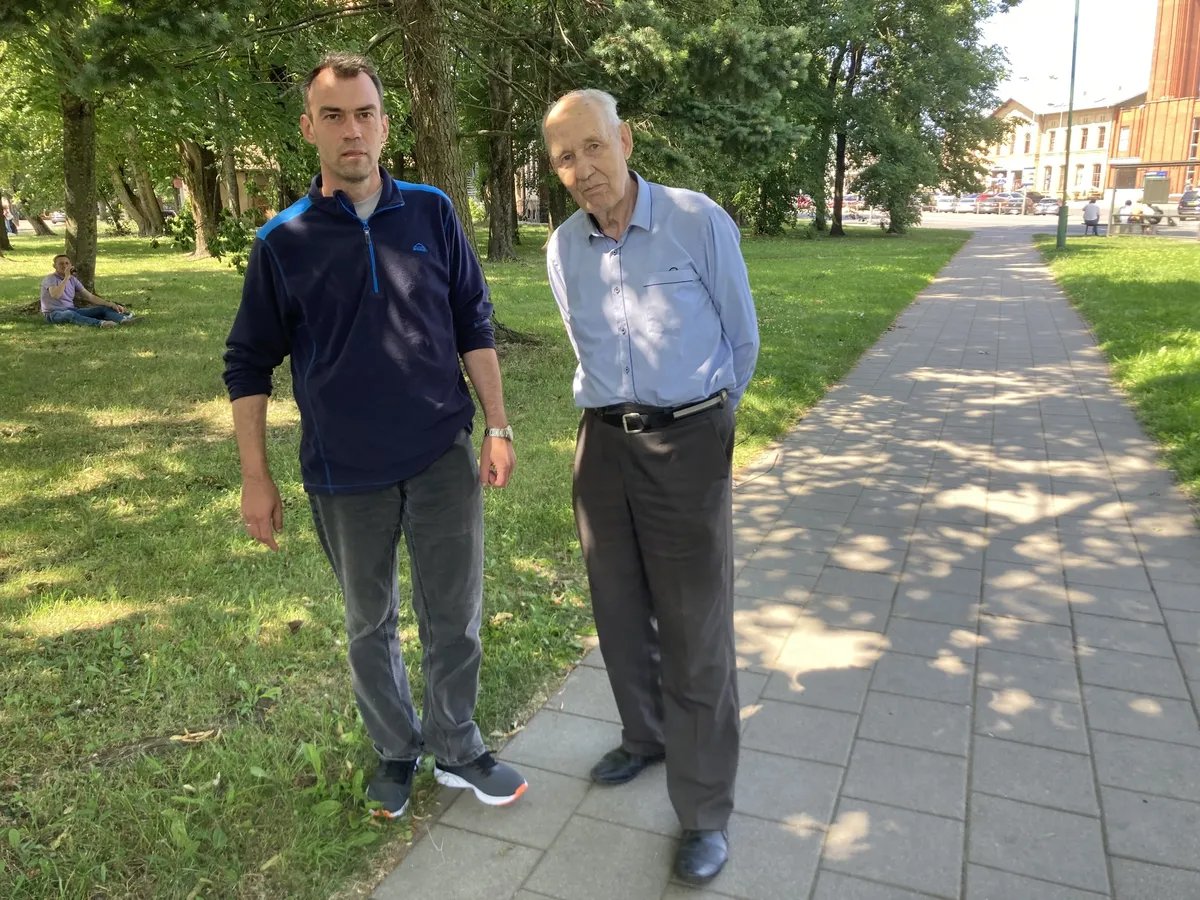
Aleksejus Greicius, director of Baltic Youth Association Juvenis (left), Rimantas Greicius, writer and Aleksejus's father (right). Photo by Ilya Azar
Greicius also arranged meetings with war veterans on the occasion of important historical dates, such as the start of the Great Patriotic War and WWII. "Our organization began conducting such events in 2013, and there have been no complaints against us. By the way, Lithuania was never badmouthed at these events. We never spoke about Jews who died here [a matter of heated controversy and debate in Lithuania]. This was a taboo for us, because why foment tensions if we live together with the Lithuanians on the same soil," Greicius tells me during our interview in Klaipeda.
In 2019, he was summoned to the Lithuanian State Security Department (VSD) for a conversation. At the meeting, Greicius was told that his Russian acquaintance, Piotr Taraskevicius, whom Greicius considered a representative of the Victory Fund military patriotic organization, was in fact an FSB agent whose real name was Chagin. VSD officials demanded that Greicius sever contacts with him, and they had him sign his consent, but he did not stop communicating with Taraskevicius. "We had good friendly relations. I didn’t see any signs of the FSB, and I know how the DSV can err. For instance, you and I are talking now, and suppose they tell me later that you're from the FSB. Is there anything wrong about asking for evidence, at least indirect?"
"Didn’t it make sense to be more careful?" I ask him.
"But that's idiocy!" Greicius snaps. "Is the FSB flush with cash? They say he paid for pictures from events, but they were publicly available. True, Taraskevicius would give 100 to 300 euros for those events, their whole budget being 1,000-1,500 euros! That's just ridiculous! Since when public data has been treated as secret and dangerous? Nobody's given me an answer to this question."
He is convinced that the true reason of his prosecution is the VSD's desire to report at least about some job they do, plus intimidate Russian-speaking activists. "An anti-Russian campaign is being unfolded in Lithuania. Excuse me, how can it be that no Russians are invited to Day of Ethnic Communities in Klaipeda? And what's so special about holding an Immortal Regiment march in Klaipeda? This is commemoration, not propaganda. What does Putin have to do with that? The people buried in our city were not invaders, they were liberators. If someone died in 1944, what did he invade?" Greicius inquires angrily.
"The Lithuanians believe the country had been occupied even before the war," I point out to him.
"And was it not occupied by the Nazis during the war? Did Lithuanians not die in concentration camps? Was our president's father not put in a concentration camp? And who freed him?" Greicius bombards me with rhetorical questions.
The activist insisted that reducing the number of Russian-language schools in Lithuania is discriminatory.
"On the one hand, after studying math at a Russian school, I had really hard times in college," Greicius is reasoning not quite logically. "But education should remain Russian. Why oppress a language at all? Klaipeda is a port city located right next to Kaliningrad. Why can't it have signboards in the Russian language? Why can't papers be filled out in the Russian language here? Especially considering how many elderly Russian-speaking people live here. And this wouldn't obstruct assimilation in any way!"
Juvenis has not held any events in the past few years, and May 9 is no longer celebrated in Klaipeda, either, Greicius complains.
"Last year, the chairman of the organization of WWII veterans asked for permission to hold an event, and the condition was that the personal data of everyone who came be recorded," says Aleksejus's father, writer Rimantas Greicius, who came for the interview together with his son.
"Stalin's got nothing on them," Aleksejus notes sarcastically.
The younger Greicius comes from quite a remarkable family. His grandfather and grandmother, Jonas Greicius and Marijona Greiciuviene, were recognised by the Yad Vashem Holocaust Remembrance Centre in Israel as Righteous Among the Nations. Rimantas says that his father hid a Jewish woman at home during the war. "Someone ratted on him, SS came together with local Lithuanian stooges and told him to turn her over. Father said he didn't have anyone, although she were at home at the moment. They lined us up, raised their rifles and threatened to shoot us if they were to find anyone. But they couldn't, she managed to hide," he says.
In 1949, Rimantas Greicius was deported with his parents to Siberia, from where he returned with a Russian wife and pro-Soviet views.
"Your position is not typical for a Lithuanian who was deported to the Soviet Union. If I'd been deported to Siberia, I'd hardly have warm feelings toward such a state," I note.
"We were deported in 1949, when I was 11. My father worked as a school principal, and I perfectly remember how he sat on a bundle with our belongings in a cattle wagon and said, 'Thank God, now we don't have to fear the Forest Brothers, now we're going to be guarded'. Only later did I learn from him that our family had been hanging by a thread, for the Forest Brothers [anti-Soviet insurgents in the Baltic states in the 1940s-1950s] pressed him not to set up a pioneer organization and threatened to kill him. But how could he not do that if the local administration labeled him an anti-Soviet element otherwise? And those from the forest would come to my father at night and demand lists of Komsomol members to shoot them. We had 120 teachers killed at the time," Rimantas Greicius tells me.
The writer says that, after his father was rehabilitated in 1955, he did not go home immediately but made inquiries first to find out whether they were still shooting in the woods. "And besides, my parents enjoyed an exceptionally kind treatment of the Siberians. So what should I bear a grudge against?" he says.
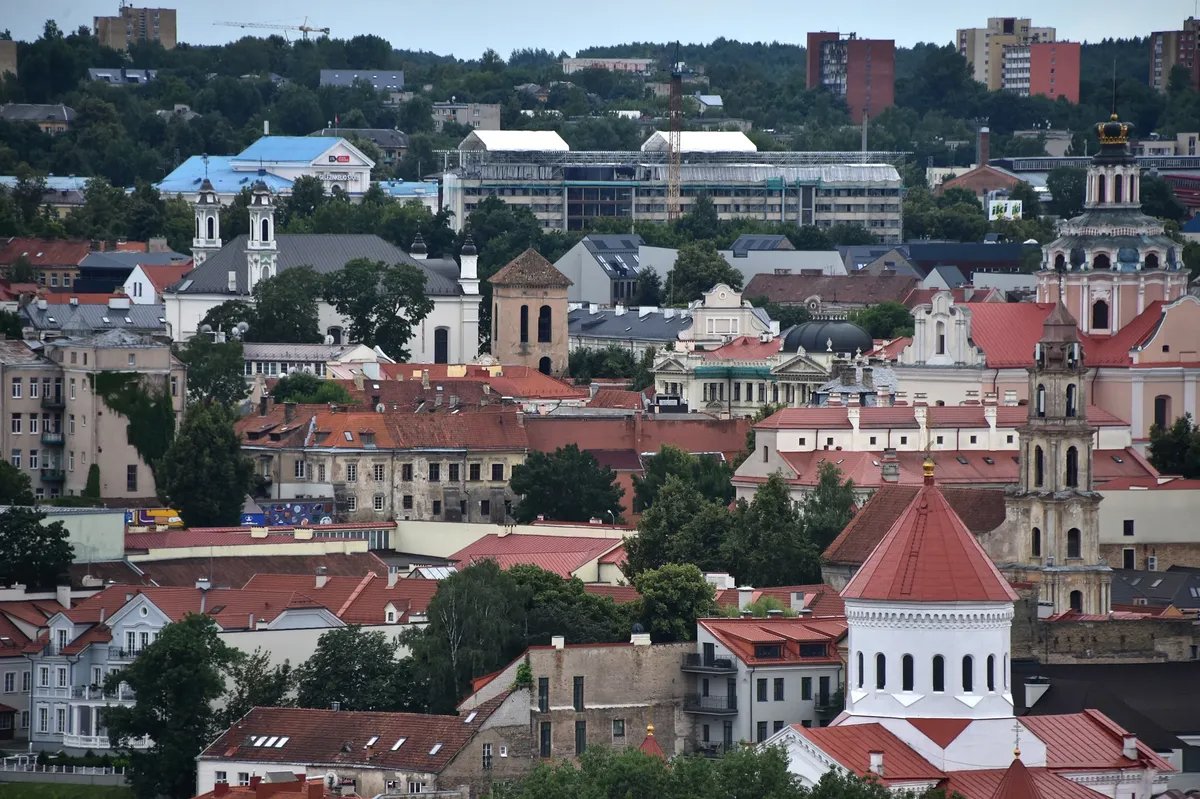
Vilnius. Photo by Vasily Maksimov, exclusively for Novaya Gazeta. Europe
"The regime!"
"Which saved us from the reprisals by the Forest Brothers?"
"It didn't save you, it repressed you!"
"A lot of people were sent to Siberia because of snitches. There are enough of them in Lithuania now, as well, even though the authorities now call them informers. For instance, an officer kicked our relatives having eight children out of the train car, and when they returned home, they caught their neighbours who'd snitched on them stealing their sofa, their pig, and so on," the older Greicius replies not quite to the point.
He says he wrote 'Down with Stalin' with his finger on window glass in 1951, for which his father, who was working as an accountant, was sent to live at a collective farm. And yet despite all that, the writer recalls the USSR fondly and disputes the Soviet occupation of Lithuania. "Father had worked as a teacher for 12 years by 1940, but I never heard the word 'occupation' from him," Rimantas says. Moreover, he insists that Kaunas had seen "huge rallies" demanding the institution of Soviet rule.
"History is being rewritten, that's true," he says.
Aleksejus Greicius considers himself Russian, even though his father is Lithuanian.
"I had a Russian upbringing, I was raised on Russian culture. I speak Lithuanian, too, but my first language is Russian. We were born and grew up in the Soviet Union," he says.
"But why were you engaged in those activities in the first place?" I ask him.
"Otherwise, you could've ended up joining the Nazis. I wanted people to understand that veterans are necessary, because, after all, Lithuania is a democratic country. If they commemorate their guerillas, why can't we commemorate our heroes?" he asks rhetorically.
"How can you understand this? In 2015, President Grybauskaite handed me two medals awarding my late parents for rescuing a Jewish woman. At the same time, they erect monuments to the Forest Brothers who shot Jews. Their left hand doesn't know what their right hand is doing," Greicius Sr. shakes his head.
Certainly, the father and the son are unhappy about the demolition of the monument in Klaipeda. "When an excavator crushes human bones and removes the sword, what does it look like? I know a man who would say, God forbid that Russia should invade us one day, but when the monument was ruined, he wept, because his grandparents fought in the war. That was a blow to the Russians. What's the point in such humiliation?" the younger Greicius says.
He dismisses any criticism levelled at Russia, where controversial espionage cases similar to his story have long become routine.
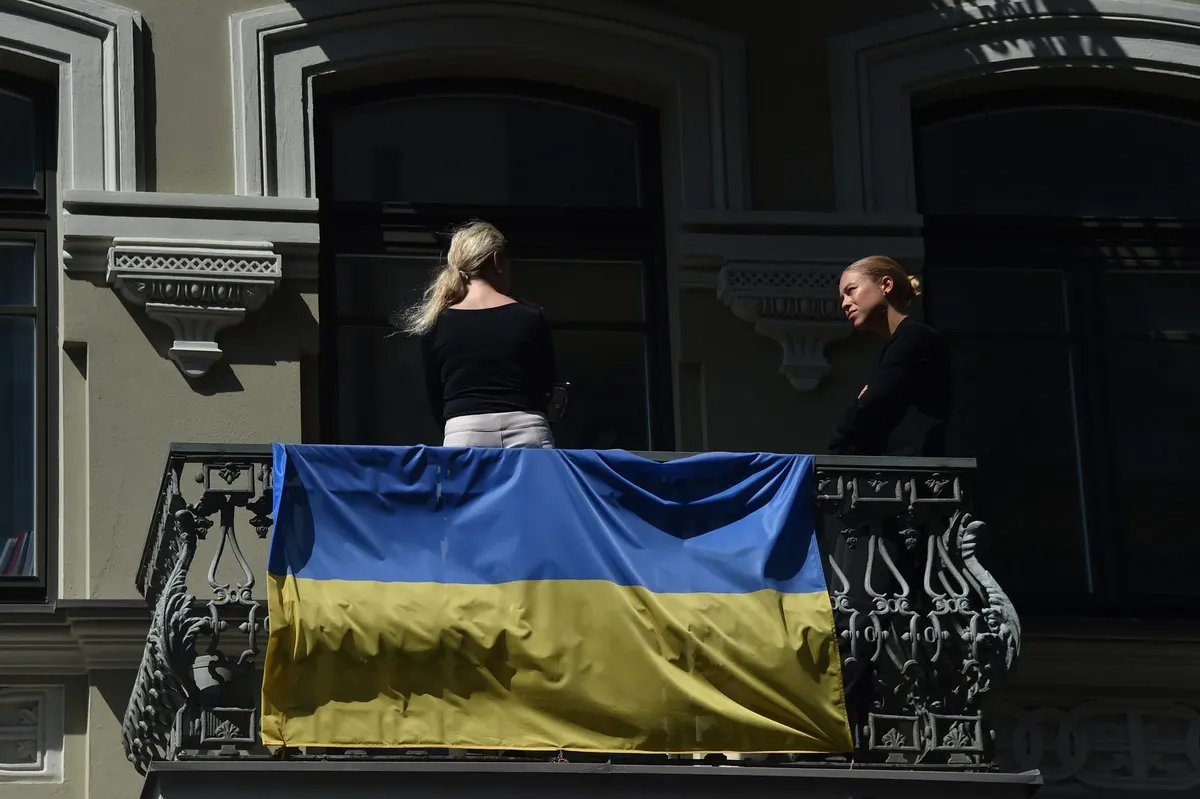
Vilnius. Photo by Vasily Maksimov, exclusively for Novaya Gazeta. Europe
"The fact that the war has been started now seems to have convinced Lithuania that it treated Russians with suspicion for a reason," I tell him.
"But why provoke? Why not be friends? Is it really necessary to hold someone at bayonet points?" replies Aleksejus.
"But it's Russia itself that behaves quite aggressively when it doesn't like something."
"Did Russia invade India or Cuba? They've been able to find common ground. Why should there be disputed issues? When the Soviet Union was breaking up, it easily gave up Memel [the German name for Klaipeda]. If they had been friendly and hadn’t provoked [Russia], they'd keep trading peacefully as before, and there'd be no problems," Greicius Jr. says.
"Anyway, Russia took Crimea away from Ukraine, and that's not very friendly," I note.
"But what about the bombing of Donetsk for eight years? Actually, Crimea is not my subject, and I've never meddled with politics," the son answers back.
"They returned [Crimea]. Taking and returning are different things," his father adds.
"Anyway, it's not friendly to take someone's territory," I insist.
"There are Lithuanians - and quite a lot of them, too - who are saying now that the tricks that our government has played with cargo transit could prompt a Lithuanian delegation to travel to Moscow to ask them to take us just as they did in 1940," Rimantas Greicius says.
"That's exactly what they're worried about," I conclude our conversation.
Roll call of Russian agents
Journalist Kishinevsky says that attitudes toward Russian-speaking people in Lithuania have changed since February 24. For instance, as early as in April, Lithuanians began to speak in earnest about renaming the Alexander Pushkin Gymnasium in Kaunas and the Russian Drama Theatre in Vilnius. "There is nothing anti-Russian about it, that's an anti-occupation matter, it's a relic. We were invaded in 1940, and the theatre was established in 1946. For how long are Lithuanians going to remain cowards, in the end? I mean bureaucrats who say this can't be done," stage director Gintaras Varnas said.
"The very atmosphere and the titular nation's attitude toward the large Russian-speaking community comprising about 200,000 people have changed. You feel it at work and in everyday life, and especially on social media, where a flow of extremely ugly and sometimes openly inflammatory comments has been growing. What's more, some of those disgusting comments, utterances, and calls are being made not by some anonymous bots but by prominent intellectuals," Kishinevsky said.
He tells me an incident involving a young Russian-speaking woman he knows, a Lithuanian citizen who spoke Russian with her little children in a café in mid-March. "A drunk man started bullying, uttering insults, and all but raising a hand to her solely based on her ethnicity. Russians go home, and so on. Fortunately, the personnel intervened and called the police," the journalist says. He maintains that such a situation had been unimaginable in Lithuania over the previous 30 years.
Kishinevsky says Russian-speaking Lithuanians have experienced unfriendly treatment at work, and Lithuanian school students resorted to xenophobic remarks addressed to their schoolmates. "When such incidents became frequent, even the mayor of Vilnius decided to make a special statement on the matter. 'If you assault and insult our Russian-speaking fellow-citizens, you should know that you are a creep,' he said. The fact that, apart from the Vilnius mayor, the Lithuanian Seimas speaker and the prime minister have also spoken out shows that the problem is serious enough," the journalist says.
Kishinevsky, a Russian-speaking Lithuanian but not ethnic Russian, says he has been discriminated against himself. At the very start of the war, he had a column published on the Lithuanian website LRT.lt, whose main message was: most of the Russian-speaking citizens of Lithuania support Ukraine, and although we are part of Russian culture, we don’t bear responsibility for Vladimir Putin. The column was accepted not very amicably, and the website's editorial board later removed it.
Meanwhile, LRT.lt said later that the column was removed because the author had withheld "important information on his collaboration with Sputnik, one of the key mouthpieces of the Kremlin. This is precisely what prompted the editorial board to remove the article, rather than alleged discriminatory circumstances."
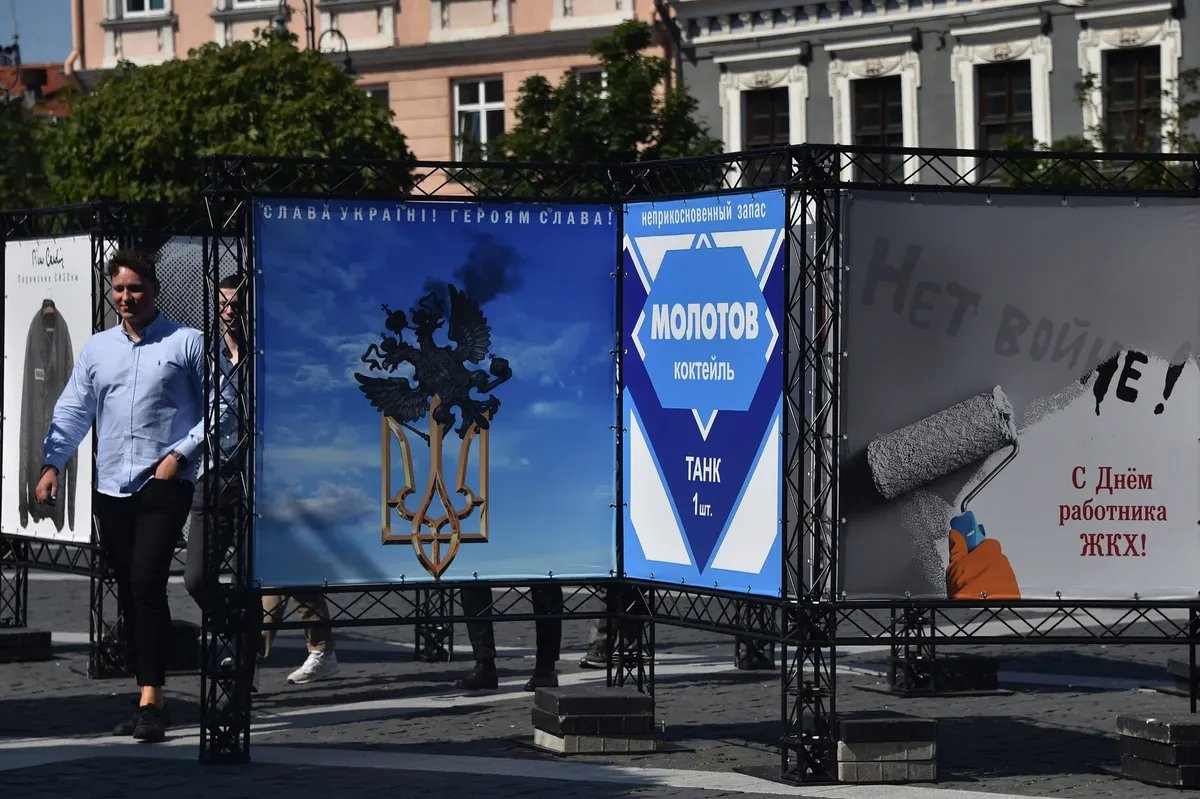
An exhibition of political posters by Belarusian artist Vladimir Tsesler on Town Hall Square, Vilnius. Photo by Vasily Maksimov, exclusively for Novaya Gazeta. Europe
Far from everyone in Lithuania agrees with Kishinevsky's position. For example, political scientist Urbonaite tells me about Russian-speaking citizens who rather support Russia. "I know people who are categorically opposed to the war, but there are also some who say that Russia is right, although perhaps not very loudly yet. They watch Lithuanian television very rarely, they are in some gray environment. It looks like it's in their DNA that they feel representing a great power, and here's some petty Lithuania – what are you fussing around here? I found out recently that one of my Russian-speaking acquaintances doesn’t even know who Anna Politkovskaya, Yury Shchekochikhin, Natalya Estemirova, and Vladimir Kara-Murza are," she says.
Historian Kasparavicius confirms that negative attitudes toward Russian-speaking people have emerged in Lithuania indeed, but not at the government level so far, even though some Komsomol-style activists and organizations have started "a roll call of Russian agents."
"Everything's very simple! If you have Lithuanian citizenship and share Lithuania's line toward supporting Ukraine, it doesn’t matter what your name is. Then you are a member of our Lithuanian family," journalist Tapinas explains. "But, definitely, we also have Russian-speaking individuals who support Russia, and that's weird. You live in Europe, but you don't have anything in common with this state. That's hypocrisy."
In Tapinas's view, there is the fifth column in Lithuania, which is comprised not only of Russian-speaking people and which works for Russia. "For instance, it's become quite typical to see someone asking on social media: 'Why are we helping Ukraine so much and forget about our own people?' This is what the Kremlin is dictating to them," he insists.
On the whole, the attitudes toward the Russian language and people with Russian background in Lithuania is better than in the neighbouring countries. For instance, Latvian President Egils Levits in July voiced his support for the idea of depriving Russian-speaking advocates of the Russian special operation of Latvian citizenship. No such ideas have been proposed in Lithuania thus far, and even Tapinas sees it as "too harsh." Latvia will also ban Russian-language instruction even at private schools and kindergartens in a few years, while Russian-language schools have no problems functioning in Lithuania.
Involuntary newcomers (3,861)
After the war started, quite a lot of political activists and journalists fearing reprisals have come to Lithuania from Russia. Most of Alexei Navalny's team members, Maria Alyokhina from Pussy Riot, the management of Mediazona, most of the employees of Mikhail Khodorkovsky's media projects, journalists Tatyana Felgenhauer, Alexander Plyushchev, Dmitry Kolezev, and others are living here now. You can hear a lot of Russian speech in Vilnius streets, and you can hardly take a stroll around the city centre without meeting a Muscovite.
Attitudes toward them are different among the Lithuanian public. Most of the people simply do not notice the journalists working for a Russian audience, but some have voiced their discontent. "We've had a discussion about what to do with a person who has arrived only now. The war started in 2014, and everything's been fine for them till lately, really? That's certainly a problem," says parliamentarian Maldeikis, but then adds, "We want to be a place where people come from Belarus, Ukraine, and Russia. After all, Vilnius has been a cosmopolitan city for centuries, where all people have lived freely. It's our moral duty to help people who flee authoritarianism."
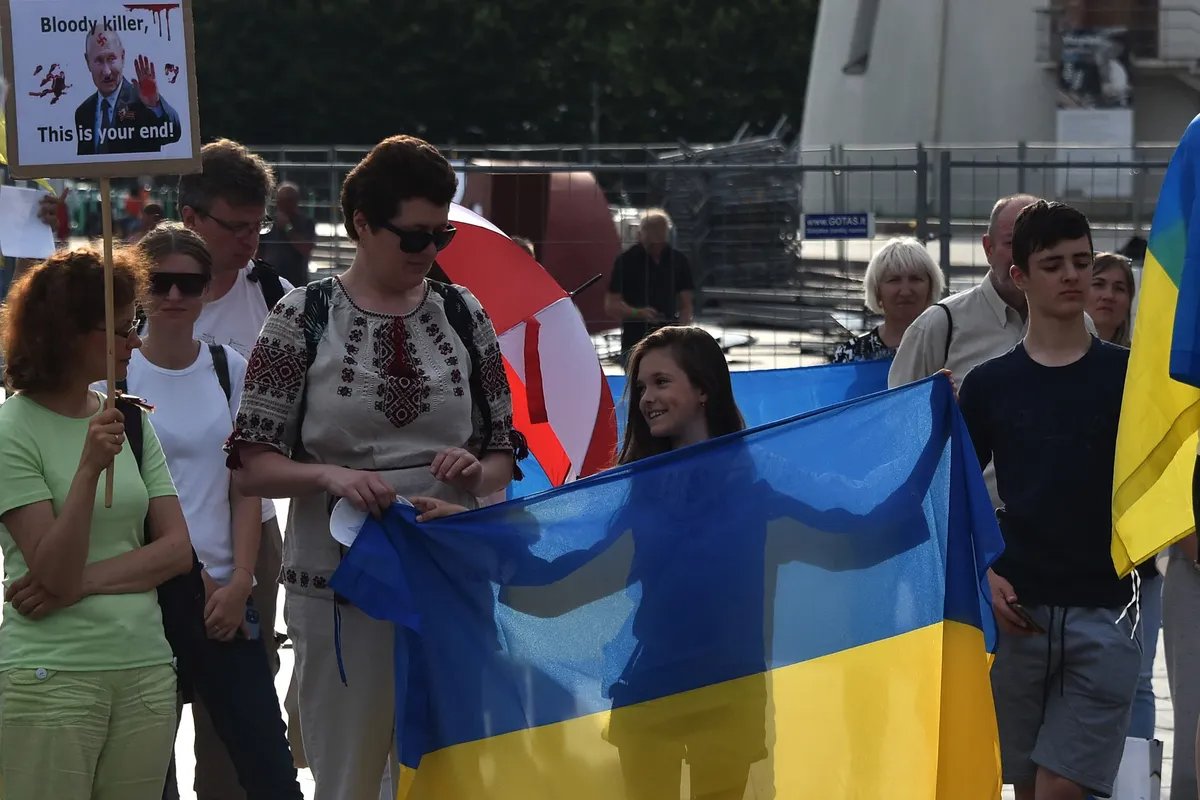
Demonstrations in support of Ukraine held each Monday on Cathedral Square in Vilnius. Photo by Vasily Maksimov, exclusively for Novaya Gazeta. Europe
"If two million Russians fleeing Putin's regime arrive in Lithuania, I don't think you'd be happy," I ask journalist Tapinas.
"Vilnius hosts the Free Russia Forum, where Russian opposition figures meet. But of course, it should be understood that there is no free space in Lithuania now because of the Ukrainians, and priority is given to them. I'll tell you honestly: our special services should check every person fleeing Russia. Are they fleeing because something threatens them or because they're carrying out an assignment?" Tapinas replies.
Mikhail Maglov, an investigative journalist from Proekt, arrived in Vilnius eight years ago, when he was a political activist and feared to become a suspect in the Bolotnaya Square case. "Thus far, I have never regretted to have moved here. I feel pretty comfortable here. If you walk around Vilnius in a T-shirt with Putin's image and shout 'Lithuania needs to be occupied', then you'll have problems. But I've never experienced any mistreatment over this time," Maglov says.
It was a matter of principle for him to send his children to a Lithuanian kindergarten. "What sense does it make for me to send them to so-called Russian schools? They'll learn Russian at home anyway." Maglov says there is no problem speaking only Russian in Vilnius, and he himself has still not learned Lithuanian. "If you go to the police or visit a doctor, you can book an appointment with an employee who speaks Russian. If you take a driving test, you may choose the Polish, Russian, or English language," Maglov says, adding that there is no Russophobia in Lithuania.
***
"However strange it may sound, but I'm actually pulling for Russia! I want it to overcome this somehow. My mom in 2019 travelled to Siberia, where she'd spent all her youth. She returned and said, 'I walked out of the plane in Krasnoyarsk, it was hard to breathe'. She went to the village where she'd lived when she was young, which she says was quite good at the time, but now the river where she used to swim is no longer suitable for that," political scientist Urbonaite says.
Parliamentarian Maldeikis's Twitter profile says that he leads a parliamentary group for relations with a democratic Russia.
"We set it up in 2020 to institutionalise possible assistance to Russian opposition at the political level. This implies ties with those people who wish to see a democratic Russia," he explains.
"Do you think this is possible at all?" I ask Maldeikis.
"This is just a matter of time. Yes, Russia is very militarised and absolutely plagued by fascism now. It needs a shock, like what happened in Germany when tanks rolled into Berlin in 1945, and – poof! – all Germans woke up and saw that what Germany had been doing was no good at all. I don't think there'll be a street revolution or a palace coup in Russia, but we'll wake up one day and see that everything is turned over. I am absolutely sure! And it's going to happen sooner than you think," he reassured me.
Join us in rebuilding Novaya Gazeta Europe
The Russian government has banned independent media. We were forced to leave our country in order to keep doing our job, telling our readers about what is going on Russia, Ukraine and Europe.
We will continue fighting against warfare and dictatorship. We believe that freedom of speech is the most efficient antidote against tyranny. Support us financially to help us fight for peace and freedom.
By clicking the Support button, you agree to the processing of your personal data.
To cancel a regular donation, please write to [email protected]
